
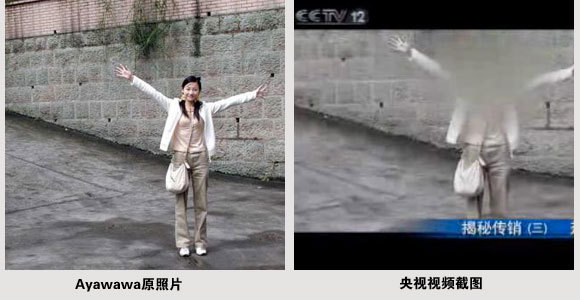
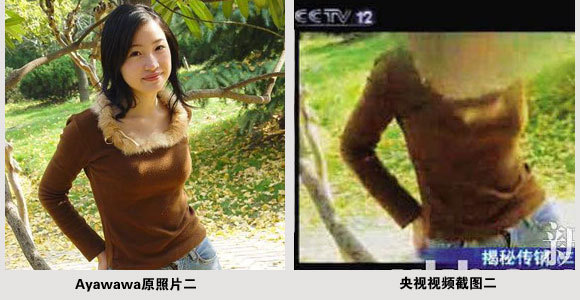

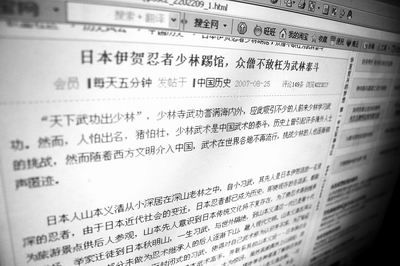
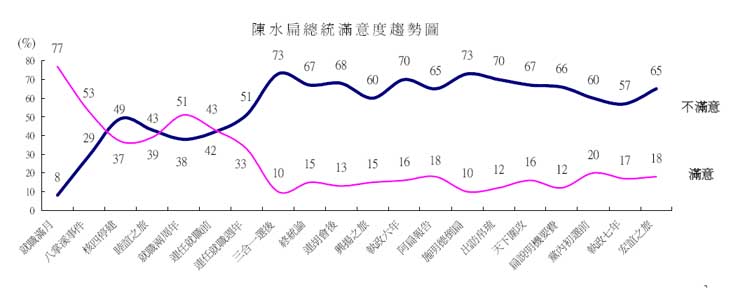
江湖淫娘
红楼绮梦
骆冰淫传
夫妇乐园
阿里布达年代记
爱神之传奇
不良少女日记
沧澜曲
创世之子猎艳之旅
东北风情熟女之惑
风骚侍女
·海盗的悠闲生活
黑天使
黑星女侠
混蛋神风流史
狡猾的风水相师
狂风暴雨
俪影蝎心
梦中的女孩
秦青的幸福生活
四海龙女
逃亡艳旅
我的性启蒙老师
现代艳帝传奇
星光伴我淫
倚天屠龙别记
淫术炼金士
十景缎
往事追忆录
舌战法庭
少妇白洁
风月大陆
风尘劫
美少妇的哀羞
阿兵哥言语录
遥想当年春衫薄
王子淫传
神雕外传之郭襄
睡着的武神
少年阿宾
According to The
Sun, 共和國二○四九
(The Republic 2049) is listed too. The short summary is: On the
opening day of the 2008 Beijing Olympics, Taiwan's President Chen Shui-bian
pronounced Taiwan independence and the People's Liberation Army immediately
attacked Taiwan. Is this "obscene pornography"?
Actually, this is a misrepresentation of "The Republic 2049"
because there was only a brief mention about 2008 and the real story was
about the Japanese invasion (backed by USA) of the united Korea (backed by
China) in the year 2049. So The Sun was probably referring to a prior
list of banned novels that included many military warfare titles.
The Southern Metropolis Daily
reporter also noted that many of the banned looks in the two previous lists
(15 and 45 respectively) can still be found at the search engines. The
reporter also noted that one of the weaker areas in enforcing the ban is
mobile phone downloads. For example, books such as 少年阿宾
(Young Man A-bin) is one of the most popular titles at some electronic book
websites.
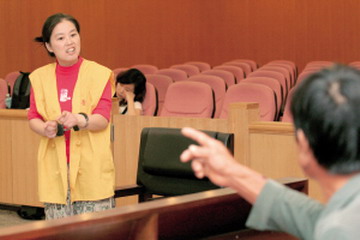
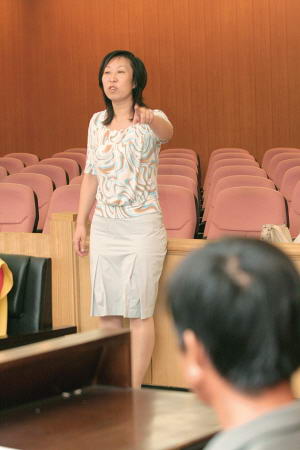
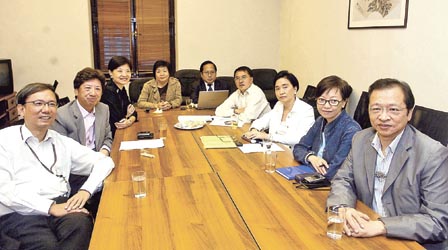
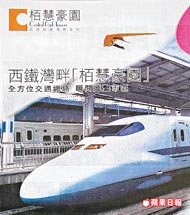
Let us consider a two-class prediction problem (binary classification), in which the outcomes are labeled either as positive (p) or negative (n) class. There are four possible outcomes from a binary classifier. If the outcome from a prediction is p and the actual value is also p, then it is called a true positive (TP); however if the actual value is n then it is said a false positive (FP). Conversely, a true negative has occurred when both the prediction outcome and the actual value are n, and false negative is when the prediction outcome is n while the actual value is p.
The relevance is to this IDG news service report (via PC World):
Reporters Without Borders criticized the Chinese government for what the press advocacy group considers a move to end anonymous blogging in the communist country. The government, through the Internet Society of China, recently drafted a pact that was signed by at least 20 major blog service providers in the country, including Yahoo Inc. and Microsoft Corp., the Paris-based watchdog group said Thursday. "The pact stops short [of] the previous project of making it obligatory for bloggers to register, but it can be used to force service providers to censor content and identify bloggers," the group said in a statement. The pact, unveiled Wednesday, signals an "imminent" new wave of censorship and repression, the group said.
...
Microsoft, in an e-mail statement on Friday, acknowledged that on Aug. 21, MSN China, a joint venture with Shanghai Alliance Investment Ltd., signed the document, which it says is "in line" with similar agreements adopted by other countries and organizations. "Such self-regulatory codes are an effective means of helping to protect our customers from cybercrimes and other threats to online security and privacy, and to promoting a safe, friendly environment in which to enjoy our services," the statement reads. Although it signed the document, Microsoft doesn't agree with some of its recommendations, such as requiring people to register with their real names for the company's Windows Live Spaces blog hosting and publishing service. "It should be emphasized that these are indeed recommendations only, and we retain discretion to determine how to best achieve the overarching goals of the agreement," Microsoft said.
The pact "encourages" blog service providers to require that people provide their real names and contact information in order to let them post blogs, and then store the individuals' information, the press advocacy group said. The pact also says blog service providers should "monitor and manage comments" as well as delete "illegal and bad information," according to Reporters Without Borders. In its statement, the group quotes Internet Society of China Secretary General Huang Chengqing as saying: "Blog service providers who allow the use of pseudonyms may be more attractive to bloggers, but they will be punished by the government if they fail to screen illegal information."
In its statement, Microsoft said that government actions taken to address security, safety and other concerns, and which impact free expression and privacy "should be taken with deliberation and restraint." Ultimately, through international dialogue, Microsoft supports the establishment of consistent "national actions" and the development of a set of principles to guide Internet companies providing services worldwide. "To this end, Microsoft has joined with a diverse group of companies, academics, investors, technology leaders and human rights organizations to seek solutions to the free expression and privacy challenges faced by technology and communications companies doing business internationally," the statement reads.
Also from AFP:
US Internet giants Yahoo and MSN confirmed that they had signed a code of conduct for their blogging operations in China that committed them to protecting the interests of the Chinese state. Yahoo, Microsoft's MSN and other blog providers in China this week signed the "self-discipline" pact, under which they pledged to "safeguard state and public interests," according to a statement from the China Internet Society. The pact "encourages" the Internet firms to register the real names, addresses and other personal details of the bloggers, and then keep this information. The firms also committed to delete any "illegal or bad messages", according to a copy of the pact posted on the society's website. Along with sex and violence, China's communist rulers have also deemed that opinions critical of it or the spreading of democratic ideology are not allowed.
Yahoo China and MSN told AFP they had signed the pact, but did not give any further comment. "I can confirm that we signed the pact this week," Yahoo China's Beijing-based spokesman Dou Xiaohan said. MSN China spokesman Feng Jinhu said: "We've signed the pact but there is no press release on that. On your other questions, we will get back to you as soon as possible."
That is how one side interpreted the actions. Meanwhile, here are some things that the Chinese media reported this week:
- Typhoon Sepat hits Xiamen (Fujian); 63 workers from big Internet company are missing! Note: This was fabricated by the promotional people at this Internet company in order to make their company name better known all over the world (see Comment 200708#072).
- "Do not use toothpicks in restaurants! Recently, a group of AIDS patients have been dabbing toothpicks with their blood in restaurants and then replacing them in the box for the purpose of spreading the disease. Please be careful!" (see Comment 200708#065).
- "Jingjiang student accepted by Tsinghua University dies after being chased by Jingjiang traffic police for traffic violation." (see Comment 200708#065).
- "Students will be shot at the XX middle school in Suzhou and the casualty count will be worse than that at Virginia Tech." (see Comment 200708#065).
If this is a battle for the hearts and minds of the Chinese netiziens, they will overwhelmingly choose for the government to track down the individuals that disseminated the rumors listed above and punish the perpetrators in accordance with the law. Do you believe that Google, MSN and Yahoo should refuse to turn over the relevant user information in the name of freedom of expression?
Related Link: Chinese bloggers thumb their noses at "self discipline" Rebecca MacKinnon, RConversation
Since May 2007, the Chinese government initiated a joint campaign against pornographic websites and began to require websites and bulletin board systems to register. All unregistered websites were to be shut down. Trials were conducted in the cities of Beijing, Tianjin, Shanghai, Henan and Guangdong. On July 25, there was a notice to the effect that "website registration will begin across China based upon the experience from the trials."
According to the regulations, website registration occurs with the Ministry of Information Industry whereas BBS registration occurs at the provincial-level Telecommunications Administration Bureaus. The local public security bureaus will issue their own administrative policies. In Guangdong and elsewhere, the public security bureau has issued notice that all unregistered forums will have their servers confiscated. The webmasters are protesting that the requirements for BBS registration are too demanding -- "real-name registration," "24-hour monitoring," "standalone servers" and so on will practically kill off all personal websites. Furthermore, the review period is so long that nobody can make it. When Asia Weekly called the Shanghai Telecommunications Bureau about the estimated time for BBS registration, the response was that it was not possible to provide an estimate because their bosses have not clued them.
According to the Internet administrative regulations in China, Bulletin Board Systems refer to not just community forums, electronic notice boards and comments board, but they also include blogs with comment functions as well as chat rooms. Williamlong.info (the "Moonlight blog") is a personal blog that discusses Internet technology, including contents about "breaking through the Great Fire Wall." The Shenzhen public security bureau had asked the blogger Mr. Long to delete certain posts as well as invited him to "drink tea." The Internet Supervisory Bureau told Mr. Long that there is a fine of 5,000 RMB for an unregistered BBS, and he had better have a registered "Internet safety worker." This Internet safety worker will have to trained at a designated organization and issued a certificate for the grand sum of 660 yuan. Furthermore, he would have to purchase the appropriate Internet surveillance and administrative software ... so it seemed that website registration goes beyond administrative issues into revenue generation for the executive department. Mr. Long had no choice but to move his website overseas, and he has a lot less trouble as a result.
Since July, there are many forum posts that recognize the difficulty of website registration in China and therefore present the experience of overseas hosting. The American companies that offer cheap rates and good service became extremely popular. In order to attract Chinese clients, American service providers have begun to offer Chinese-language service instructions as well as hiring administrators fluent in Chinese.
... One netizen said that the current clean-up campaign has serious consequences: The Chinese Internet service providers are losing revenue and this will affect the development of the Internet industry as a whole. Furthermore, when the forums migrate overseas, the relevant departments will have no effective way to administer them. As a result, pornography, politics and violence will proliferate ...
China Airlines has painted over its name and logo on the wreckage of a passenger jet that exploded in flames at Naha Airport in Okinawa moments after passengers slid down emergency chutes to escape.
The airline painted over the name "China Airlines" on the left-hand side of the aircraft and the company's logo on the plane's tail fin.
After the accident, photographs and video footage of the jet continued to appear in news reports, and the company apparently painted over the name and logo to limit further damage to its image.
Before painting over the name and logo, the airline sought permission from the Land, Infrastructure and Transport Ministry's Aircraft and Railway Accidents Investigation Commission. Officials granted the request, judging that it would not hinder the investigation into the accident, and the airline painted over the markings following inspections carried out on Tuesday.
When questioned over the move, an official from the Taiwan-based airline said, "We followed international procedures. We do not have detailed information."
Indeed, there are plenty of other examples. For example, ABC reported from Indonesia: "Meanwhile, airline officials have declined to explain why a logo on the wreckage has been painted over. Before it was painted over and then cut down, the stylised flying garuda emblem could be clearly seen on the burnt tail of the plane, where it exploded past the end of the runway at Yogyakarta airport. On the side, a registration number identifying ownership of the wreck was also visible before it too was painted over with white paint. The practice, designed to limit bad publicity, was also used to disguise an Adam Air flight that crash-landed and almost cracked in two in Suryabaya several weeks ago."
But the practice is not universal, because I have taken the famous Sandia Tram in Albuquerque (New Mexico) from which one can see an airplane wreck down below in a canyon known as TWA Canyon (see Wikipedia). The TWA logo is not intact, though (see photo).
The US Democratic Party and Republican Party will be holding primary elections for their presidential candidates next year. Last month, CNN and YouTube joined to hold a debate forum of the Democratic Party candidates. In Hong Kong, there is no universal suffrage, but some people are trying to bring the primary election culture and atmosphere to Hong Kong by holding a debate forum among pan-democratic candidates for the Hong Kong Island Legislative Council by-election to replace the late Ma Lik.
Ideally for the pan-democrats, this forum will allow the candidates to debate publicly so that the participants can agree that the winner is the better candidate. The pan-democrats also want to use the forum to draw more citizens to participate here, so that they will give their support in the by-election as well as the debate on political reform. This will also be helpful in the district council elections on November 18. But a coin has two sides, and the pan-democrats have two big worries.First of all, the reason for the forum is that the interested persons -- Cyd Ho of Civic Act-Up, Raymond Wong or Lo Wing-lok of the League of Social Democrats and Kam Nai-wai of the Democratic -- party have different degrees of name recognition. If the pan-democrats move ahead directly with a public opinion poll, those with better name recognition will do better for sure. But if a public debate forum is held, the citizens will be able to make a more objective evaluation after watching their performance.
But according to the previous experiences of pan-democratic street forums, they will only draw a few dozens spectators, especially since this by-election forum will not be like the Chief Executive debate forum held this past March. The political ecology of Hong Kong is not as mature as that in USA or Europe. If too few people show up, it would not achieve the effect that the pan-democrats hope for and the citizens will decide by name recognition if they are polled.
But there seems to be a turning point here, as a certain Commercial Radio has contacted Emily Lau, the convenor of the forum, to discuss live or delayed broadcasts of this primary election forum. There is a good chance for this to happen.
The other problem for the pan-democrats is that there may be scenes in which pan-democratic candidates verbally attack each other at the forum. Before they even deal with the opponent, they are already at each other's throats. If this is badly managed, it could affect the voting intentions of the pan-democratic supporters on Hong Kong Island, perhaps even cashing away supporters who detest personal attacks.
Ronny Tong of the Civic Party said that it is inevitable that one would describe others as being adequate during a bpucli debate. But he believed that the candidates will be expressing their own platforms and that there will not be any divisions among the pan-democrats.
The candidate Cyd Ho hopes that this forum will bring in a new political culture so that people will see that the competiion among democrats is a gentlemanly one. But some democrats who do not like the candidacy of Cyd Ho has already indicated that they will bring up at the forum the fact that Cyd Ho has been calling on people to delay paying their government rates and rents in civic protest against the absence of universal suffrage. So its seems that sparks will fly at the primary election of the pan-democrats.
Addendum: The last paragraph refers to Cyd Ho's call for civil disobedience by delaying rate and rent payments to the government to fight for universal suffrage. People have questioned the logic of this call for action. For one thing, government operations do not depend heavily on these types of payments. For another thing, there is a 5% penalty after the first warning for delayed rates payment and a 10% after the second warning. So this means that the protestors are actually earning interest for the government. Eventually, the rates will have to be paid or else the property cannot be sold.
An Internet post titled <The Sinofication of World of Warcraft resulted in almost 10,000 filtered words, thus seriously affecting the quality of the online game> is making the rounds. "Users are finding out that their chat sessions can have some words mysteriously replaced by characters such as @#$^&%. This often make ordinary communication impossible."
Here is an example: Suppose you type "银行门口交易" (translation: Make the transaction at the entrance to the bank). You will get "银行门#$%^&*易" instead. The problem here is that the entrance (or the 'mouth') of the bank combined with transaction is the term "口交" (translation: fellatio). Therefore, you get "#$%^&*" instead. As another example, "红色魔纹护肩" (translation: Red-colored demon-tatooed shoulder wrap) appears instead as "红#$%^&*纹护肩". The problem here is that "color" in combination with "demon" is "色魔" (translation: sex fiend). Very common terms become filtered because they can be taken to mean something else in the surrounding context.
So what is the truth of the filtering? The reporter compared the mainland and Taiwan editions of World of Warcraft. There are 9,133 filtered words in the Taiwan edition, and 9,685 in the mainland edition. Prior to July this year, both versions had 9,133 filtered words. When version 2.1.3 was introduced in mainland China on July 17, 532 new filtered words were added. There are basic types of situations: Insulting language such as "sex fiend"; politically sensitive terms such as "People's Congress" and "Communist Party Political Consultative Conference"; terms affecting the business (e.g. the name of the company that distributes World of Warcraft in China and even its CEO).
In truth, many of the 9,133 filtered words in the Taiwan/mainland China edition come from elsewhere and they are used universally in all editions of World of Warcraft. More than 1,000 of these terms are Korean-language and come from the Korean server. More than 7,000 of these terms are English-language and come from the US and European servers. Only about 500 of them are Chinese-language. So as of now, there are about 1,000 Chinese-language filtered terms in the mainland server. Therefore, it is an exaggeration to claim that China is filtering almost 10,000 terms in World of Warcraft. That is literally true, but the United States is filtering 9,133 terms in its version.
P.S. There is a mystery here about the filtering of the Journey To The West character Monk Sha (沙僧). This character is not even a part of World of Warcraft. Here are the speculations about the reason:
1. Monk Sha wears a necklace of 9 human skeletons around his neck. Since the Chinese version of World of Warcraft has been 'sanitized' at the request of the relevant department by having all skeletons replaced with corpses (see Comment 200706#101), Monk Sha should not be mentioned.
2. Monk Sha is the nickname of a senior manageer of the distributor company.
3. The person in charge of setting up the filtered terms added this in order to make fun of the system.
4. Some people may regard Monk Sha as a dedicated religious man, and this respects their view.
5. "Monk Sha" rhymes with the Chinese term for "kill monk" and this is disrespectful to religious beliefs.
6. Another game company distributes a game based upon Journey To The West, and therefore Monk Sha was filtered for competitive reasons.
7. It is one thing for Monk Sha to be filtered, but what about another Journey To The West character, the Bull Demon King? Why was he filtered as well?
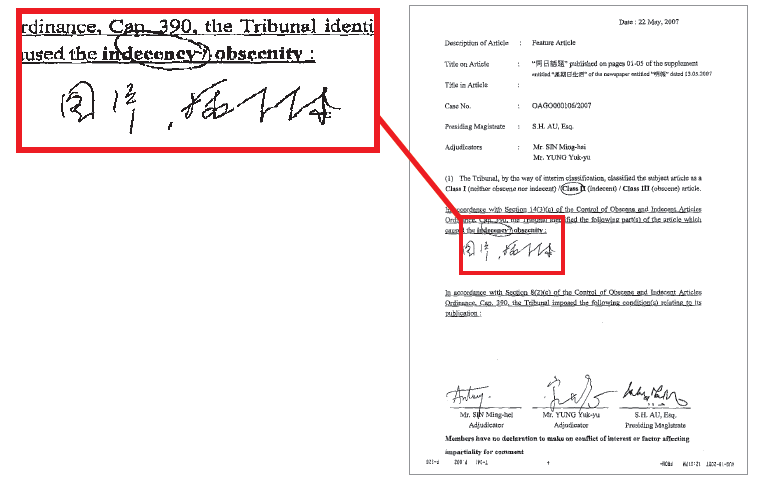

#1. "Do not use toothpicks in restaurants! Recently, a group of AIDS patients have been dabbing toothpicks with their blood in restaurants and then replacing them in the box for the purpose of spreading the disease. Please be careful!" This item originally appeared in mid-May and the public security bureau issued warnings to the public that this was a rumor. But the police found out that the item was circulating again on July 11, with large numbers of SMS messages. The police determined that that the originator was a man named Tu using mobile phone number 1361611XXXX. Another individual named Cai also spread the same message to the same group of users. The two were arrested and explained that they had forwarded the message out of curiosity. Between July 11 and 14, they sent more than 200 messages out.
#2. At 7pm on July 31, a netizen published a post titled : <Jingjiang student accepted by Tsinghua University dies after being chased by traffic police>. In the story, a father and his son were riding a motorcycle and they encountered a police roadblock. Since they were not wearing helmets, the father sped away and the traffic police gave chase. The father lost control of the motorcycle which fell. His son died as a result. The son had just been accepted by Tsinghua University. This story drew "public rage" on the Internet. The Jiangsu provincial public security bureau elader ordered its Jingjiang division to investigate. The local police found a netizen named Ju had heard a fictional account and then wrote the post with elaboration. The police also asked Tsinghua University for the names and addresses of the six students that were accepted from Jinjiang and verified that all were well.
#3. On April 18, a post appeared at Xici Hutong's Jiangsu forum titled <The shootings at the XX middle school in Suzhou>. The post claimed: "The shootings wil begin soon. Even though it will not be the most serious shooting ever in China, the number of dead will exceed that at Virginia Tech." The provincial and city public security bureau began to investigate immediately. Several hours later, they arrested 27-year-old Xu, who used to teach English at XX middle school in Suzhou. Xu explained that he had a dispute with the school leaders and was let go. He had written the post in revenge and he admits that the post was fictional.
... The reason why the problem of 'rumors' is complicated is that the definition is vague. In real life, it is hard to determine the boundaries of rumors. In many cases, a piece of news is largely accurate but it may contain inaccurate factors. When society eliminates commentary that are not 100% accurate, it is eliminating commentary itself.
... The reason why the ability to determine rumors is a serious issue is because we are overly sensitive to rumors in this society. We are also overly vulnerable with respect to rumors. Under normal circumstances, a society should have a certain immunity against rumors. This immunity arises in a normal opinion commentary environment, where people can easily determine which news items are more credible. In our society, we are overly sensitive to rumors because we do not have a normal opinion commentary environment. The mystification of authority limits the amount of information available and the uniformity of the sources of information makes comparison hard. As a result, there is less trust for the authoritative sources of information, which sometimes even invoke an instinctive rejection. This is the reason why rumors can be so damaging in our society.
An associated problem is just why people are so enthusiastic about anonymous commentary. A basic reason is that the conditions are far from ripe for real-name commentary. If people can freely use their real names to express their opinions or disseminate information, they will do so. When that time comes, anyone who publishes anonymously will only raise suspicion and any false information will have limited impact or even becoming a joke.
In the construction of a harmonious society, policies are important but the system is even more basic. A normal opinion commentary environment is such a system.
On August 19, Chinese intellectual property rights owners sued Japanese television stations for showing almost 500 Chinese television drama series covering almost 9,000 episodes without permission or compensation from 2003 through 2006. According to the copyright owners of the television drama series <The Lettuce>, Japan's SKY PerfecTV satellite television system showed <The Lettuce> in 2005 on its channel 785. The company filed suit in a Tokyo court and won a judgment. This case is presently in the stage of determining the compensation, which is based upon the current sales price of 10 to 15 million yen per episode.
The case of <The Lettuce> is the tip of an iceberg. During this trial, the Japanese side was unable to produce any legal authorization for any of the 200 Chinese television drama series that has been shown so far. In SKY PerfecTV's channel 781, almost 300 Chinese television drama series have been shown so far almost without any authorization. Between 2003 and 2006, nearly 500 series involving 9,000 episodes had been shown without permission.Now wasn't that awful? That was until someone came along and actually looked up SKY PerfecTV's channel 781 and channel 785 (see Daqi). At the website of channel 781, the title is Shanghai Media Group/Dragon TV; at the website of channel 785, the title is CCTV 9. These are Chinese international channels that are being distributed in Japan by the satellite television platform known as SKY PerfecTV.
When a satellite television platform carries a channel signal, it does not worry about the copyrights because only the channel is liable. If there is a lawsuit, then it is CCTV 9 and Shanghai Media Group which are being sued for showing Chinese television drama series overseas without copyright payment to the producers. As early as 2003, SKY PerfecTV was offering a Chinese-language package consisting of channels 781, 784 and 785 (see Jiangsu Qiaowang). The wonder here is why the latest news reports refer to SKY PerfecTV channels 781 and 785 instead of their real identities: Shanghai Media Group and CCTV 9?
[in translation]
I remind myself to be "rational and constructive" professionally and I try to avoid certain indignant feelings and ideas in order to comment more calmly and rationally. But when I read the following kinds of news, I could not hold back my anger.
A few days ago, the media exposed the "disaster relief show" and caused a public opinion storm. In this case, the Gaoling county (Xian city) government officials distributed relief materials to the disaster victims. But as soon as the superiors left with the television crews, the local government officials took back the money handed to the disaster victims. On August 19, the county publicity department leader explained the truth: the village cadres were careless and handed the "emergency relief funds" to the wrong people. The town cadres were trying to rectify the mistake by taking the money back. Therefore, it was a "misunderstanding" on the part of reporters that the Gaoling county cadres were staging a show.
What an amazing "misunderstanding" on the part of reporters! It totally negated any possibility of "staging a disaster relief show." Instead, the town cadres became model heros for "rectifying the incorrect distribution of disaster relief funds." Is it necessary to praise and reward them with a bonus (from taxpayers' money)? Certain local departments are just astonishingly competent, because they can turn the biggest and ugliest scandals into wonderfully positive events, and political mistakes are made into political accomplishments.
The media are not the Department of Truth, and their reporting cannot be guaranteed to be 100% accurate. Due to the limitations of the news gathering techniques and scopes, the media and the reporters often make mistake. The "cardboard steam buns" case is one example. Therefore, it is certainly possible to rebut the report about the "disaster relief show" through the local departments and principals reporting about the facts of the case. In an environment in which information is transparent and communication is fluid, nobody holds the sole right to truth which is realized through continuous communication and correction.
Yet, what are the 'facts' as produced by the Gaoling people? The village cadres were "careless" and gave the "disaster relief funds" to the wrong people and the reporters "misunderstood" this action. Wow! Brothers and sisters, never mind whether the general public believes that! Would you believe such an explanation yourself? Can you convince yourself in terms of logic and experience? How can you give these very important sums of money to the wrong people? Why was this discovered just after the superiors and television crews left? Why do you admit the mistake only after the media reported on the case? The public may not be able to see the facts. But relatively speaking, the media reports about the "disaster relief show" is more consistent with the logic, knowledge and reality of China today.
Frankly speaking, it is not very infuriating to see the local departments tell lies because this is about protecting their own livelihood. We have seen enough of these cases. What is infuriating is that certain government officials are arrogant to the point that they do not bother with making up lies that show a little bit more respect for logic and commonsense. Their unbelievable lies are insults to the intelligence of the media and the public. This shows that they don't care about the media and the public: Believe it or not, this is my explanation; When I see that these are the facts, these are the facts; What are you going to do about it! If you want a more convincing explanation, then I can't be bothered.
This reminds me of another news item a few days ago. In Xiangfan city (Hubei province), citizens complained that nine municipal administrators did not pay their bill at a hot pot restaurant. After the media exposure, the relevant local government department explained: the citizen complaint about non-payment of the restaurant bill was not true. The truth was that after finishing the meal, the municipal administrators gave the sum of 175 yuan directly to the restaurant owner instead of paying at the cashier's counter. Therefore, the only mistake here is for the municipal administrators to eat there while in uniform and therefore creating a bad impression for the public. This "direct payment of the restaurant bill to the restaurant owner" must be intended to fool a 3-year-old child! Like the "disaster relief show," this is an insult to the intelligence of the media and the public.
What couldn't they come up with a more convincing and more technical explanation? Some people say that these government officials become stupid when they get corrupted by power. I disagree. They are actually not stupid at all. They are alert, smart and practical. They were not looking for an explanation to convince the media and the public, because they don't care about what the media and the public think. The media does not have to power to do anything to them, and the public cannot vote them out -- their job security lies in the hands of their superiors. So they only have their superiors in their eyes. When the scandal was exposed by the media, the superiors were embarrassed and demanded an explanation from their underlings. So these people came up with an explanation to satisfy that demand. The key is therefore that they must come up with some explanation or the other so that the superiors can explain to their own superiors.
So the completely illogical explanation behind the scandal reveals many things. They don't expect to convince you. You are only supposed to listen and move on.
I didn't mean to get into a fight with Susan Sontag.
I had gone out to dinner with her for exactly the opposite reason. I was 25 and an aspiring writer, living in Beijing and cobbling together a living as a freelance journalist. When I came back to New York for my yearly visit in 2000, I got in touch with a friend from college, whom I will call Sting. Sting worked for "Susan" as a personal assistant and he invited me to an evening film screening and meal with him and his famous boss. Of course I said yes.
...
"So you must know about Bei Ling?"
"Who?"
"He's a poet who was recently arrested there. He lives in the States and when he returned to Beijing to distribute magazines, was jailed for several weeks."
I had never heard of him. The major Western Internet sites -- CNN, BBC, the New York Times -- were blocked in China, limiting my access to news. I had been working without an official journalist's accreditation and so I had stayed away from thorny political issues, preferring to write articles about the demise of traditional Peking opera, and tampon companies making inroads into the Chinese market.
To my frustration, I found that there were only two stories that the Western press wanted to hear about China: the economy's meteoric rise and the government's oppression of its people. The iconic image of a lone man standing in front of a tank during the Tiananmen Square massacre of 1989 had not been replaced by a more complex portrait of China in 2000 in all of its contradictions.
I hesitated, not sure whether I should lie or not. I decided to adopt the know-it-all machismo of my new profession. Why lie? I was going to stand my ground.
"No," I said, "I hadn't heard about that."
"You're a journalist and you haven't heard about that?" she asked, an edge creeping into her voice.
At that point I should have just apologized for being so ignorant, but guilt and pride and all manner of human folly intervened, so I said, "Oh, um, ahem ... that's kind of dissident news ...um ... "
"What?"
"Dissident news. When you're covering news in China, you don't generally pay that much attention to the arrests of dissidents ... um..."
My hands and voice were starting to quiver like jelly. I put down my chopsticks.
"Why don't you?"
That arresting Sontagian stare you see emanating from book jackets and the pages of magazines? It had leapt off the page and was boring into me from across the dinner table. Her voice was low and commanding like a man's, transforming her question into an order. She was ready for a fight, and to my surprise, so was I. If only I could break my habit of transforming declarative sentences into questions.
"Well, dissidents just don't seem relevant sometimes?"
Sting tried to step in. "Maybe also you can't read that kind of news in China?"
"The Western press should be covering that kind of story," Susan said.
I was getting backed into a corner; the next thing I knew I would be defending the Chinese government.
"I don't know why I didn't see the story," I said, backing down. "I'm just saying that there are bigger stories in China?"
She sensed my weakness and went in for the kill.
"So, you're saying that the jailing of this poet isn't important?"
I gasped. Susan Sontag was going to sit in a sushi restaurant in the East Village and tell me that the fate of this dinky, two-bit poet who lived most of the year in the States was more important than, say, the plight of the country's 800 million farmers? The hubris!
"No. But in the grand scheme of all of the problems that China faces, I guess I'm saying it's not. China has a lot of big problems that the Western press doesn't cover. Poverty. You know, corruption," I said, racking my brains. "Environmental devastation." I looked over at Sting for help. He was drawing his finger across his throat.
We went back and forth for a few minutes, neither of us budging, before Susan turned away and ignored me for the rest of the meal. I tried to pick up my chopsticks but my hands shook too violently to lift even a single piece of sushi, much less choke it down.
We parted ways after dinner. Sting helped Susan get into a cab, and then he and I walked to the subway.
We parted ways after dinner. Sting helped Susan get into a cab, and then he and I walked to the subway.
What a mortifying initiation into New York literary life. My petty insecurities had made me look like an ass in front of the most famous person I had ever had dinner with. I took solace in imagining that I had joined a pantheon of great minds who had locked horns with Susan Sontag.
"Do you want to know why she got so angry?" Sting asked.
"I don't know, do I?"
"She was personally involved in getting that poet out of jail. She and other PEN writers petitioned the Chinese government for his release," he said. "So you were basically taking her to task for being a Western intellectual with an inconsequential pet project."
I started laughing. I had schooled Susan Sontag! Relief washed over me.
She was right to defend freedom of speech, but I was right about China's having more basic and urgent problems. Dissidents might be a sexier sell than farmers, but they weren't necessarily more important.
My mortification began to fade as we walked. Her obstinacy, like mine, had not been fueled by a lofty sense of moral responsibility. We had both been motivated by personal passions and insecurities. And that was perfectly fine. In the end, she had schooled me too.
When I was younger than 20 years old, I believed in many things. Later, one after another of those beliefs was overturned.
I used to believe in patriotism, but I later found out that the definition of 'country' was problematic. The standard 'country' that we were instructed to love was not necessarily lovable, it was not necessarily worthy of our love, and it even deserved to be overthrown.
I used to believe in history, but I later found out that half of history was fabricated. The history of the preceding dynasty was always written by the people of the succeeding dynasty, who will always negate their predecessors. In turn, their succeeding dynasties will always negate them. But double negatives do not necessarily end in a positive and we are just accumulating the successive distortions and twists so that the truth will always be covered up and never restored. It is one thing to say that "history must not be buried in ashes," but history often wind up in ashes. It is possible to win by distorting and misinforming.
I used to believe in the power of civilization, but I later found out that the stupidity and barbarity of people do not disappear as a result of any progress in civilization. It is just that stupidity and barbarity take different forms: simple peasant workers, reflective intellectuals, self-confident politicians and righteous leaders may bring out even worse stupidity and barbarity. Between barbarity and civilization, there is only a subtle and easily erasable difference.
I used to believe in justice, but I later found out that there exists two kinds of justice that are in irreconcilable conflict with each other. If you choose one, then your justice implies injustice. You won't be able to tell that when someone advocates a particular kind of justice at a particular moment, there is a hidden and unobservable injustice underneath.
I used to believe in idealists, but I later found out that idealists cannot pass the test of power: once they obtain power, they could become the "evil" that they had vowed to fight, or else they are utterly feeble in reality and are brought down immediately by the power mongers without being able to achieve their ideals. The idealists must have character and morality in order not to be corrupted by power and the idealists must have the capability to turn their ideals into practice. But it is rare to find any ideals who have both character and capability.
... Before I was twenty years old, I believed in many things. I still believe in some of them even today.
For example, even though the country may not be lovable, but the its earth and people can still be loved. For example, if history cannot be trusted, but there is no end to the pursuit of truth. For example, civilization may be weak and vulnerable, but we have actually nothing else to rely on. For example, justice may be extremely suspect, but caring about justice is better than not. For example, idealists may not be able to accomplish much, but our society will be different without them ...
... There is great deal to ponder deeply about what to believe and not to believe.
When Sun Haiying said that "homosexuality is a crime," I thought that he was going to get into trouble. Indeed, there was big trouble. I was reading <Beijing News> on August 16 and I saw <Li Yinhe blasts "Homosexuality is a crime" talk>. I went to search for "Sun Haiying" on Baidu and I found "Sun Haiying homosexuality" among the results. There were numerous Internet posts that criticized Sun Haiying. This showed that things have changed on the Internet: at first, it was Sun Haiying attacking homesexuality and now it has become homosexuals attacking Sun Haiying. Criticisms are being lofted back and forth and the battle has just begun.
I do not intend to discuss the issue of "homosexuality is a crime." I only want to discuss Ms. Li Yinhe's "blast" essay. That essay is actually very short and appeared originally on August 14 on her blog. But when I read it carefuly, I found the tone and choice of words to be interesting. The title of the essay was <Raising respect for homosexuality to the level of building a harmonious society>. The title seems to carry a boldness in vision that could compete with the titles of the editorial pieces in <People's Daily>
The first sentence of Li's essay was "I recently saw Sun Haiying's erroneous sayings and I felt that I had to say a few words." The essay therefore started with a bang, but it contained a certain tone of officialese; and "erroneous sayings" can easily remind people of the familiar choice of words in officialese. I read on: "Sun Haiying's words displayed ignorance, cruelty and lack of culture. It is simply incredible that someone can say such things in the 21st century." Then some examples were offered (such as Hitler sending homosexuals away to concentration camps). This may be treated as the basis for refutation and it is not a big problem. But the words were mean and spiteful. Then she began to raise this to a higher level. I will cite the original text: "Our nation is presently advocating the building of a harmonious society. The so-called harmony is the harmonious co-existence people from different social strata, ethnic groups and gender orientations. The rich and the poor, the Han people and other minority groups and the heterosexuals and homosexuals should co-exist harmoniously. We should raise the respect for homosexuality to level of the construction of the harmonious society and oppose the stupid, ignorant and cruel talk of Sun Haiying that destroys social harmony."
It should be clear why I want to bring attention to Li Yinhe's essay. In my view, whether it was the title, the form or the content, the essay was borrowing the language of officialese. The so-called "destruction of social harmony" is a political position which cannot be determined by academic discourse. Its function is similar to the "destruction of stability and unity" a few years ago, or the "destruction of the good revolutionary trend" in even earlier years. Following this line of thought, Sun Haiying's talk must not only be "erroneous" but it must be "reactionary"; it is not only "reactionary", but it is "counter-revolutionary." Such being the case, the "homosexuality is a crime" talk becomes a political problem and Comrade Sun Haiying becomes a "counter-revolutionary" in the "political arena."
This way of thinking and writing is very problematic. ...
First, scholars should have their own thinking process and discourse styles without using pre-defined language models to open the way. Otherwise, they just become dependent and lazy. From the broad perspective, Li Yinhe's essay suggestion to "raise the respect for homosexuality to the level of the construction of the harmonious society" is reasonable, but it erased the special nature of the "small narratives." Today, the term "harmonious society" has become a magical basket. Anything that is not harmonious has the chance of being rectified when placed in it. In truth, this may be a false impression. When pork, vegetables, cardboard buns, illegal brick kilns and homosexuality all get put into the same basket, they lose their distinctions. Furthermore, the line of thought is fixed. The end result may be that it has the legitimacy of being politically correct, but it has lost its effectiveness at problem-solving.
Secondly, whenever some speech becomes officialese, its nature often changes. Officialese is permeated and assembled with power, and it is characteristically monolithic, serious, stern and earnest. My understanding is that homosexuality discourse had always been conducted among the people and that was why resistance and rights defense are respected. But once homosexuality discourse is incorporated into the narrative framework of officialese, it may look more powerful but it also loses people's understanding and sympathy. Personally, I did not have any views about homosexuality. But after reading Li Yinhe's essay, I began to think: Aren't homosexuals a socially vulnerable group? Why are they now fierce and tough once they arm themselves with officialese? The end result may be that it may have gotten the backing of officialese, but it has made people imagine that it is using officialese to oppress others.
紧急声援同行!!(请朋友们广泛转贴)
记者采访凤凰事故被官方指使流氓殴打。南方都市报龙志被打最重,中国青年报洪克非的JJ被踢了两脚,了望东方记者也被打湘西州委常委、宣传部长周小毛公开宣称:在这里只有新华社和人民日报的记者受保护,其他媒体都是非法采访,其人身安全不受保护!
打人的不肯透露自己的身份
现在只知道都是县政府的[in translation]
Emergency call for help from fellow workers! (Please re-post as widely as possible)
Reporters covering the bridge collapse in Fenghuang: The reporter from Southern Metropolis Daily was seriously injured; the China Youth Daily reporter Hong Kefei was kicked a couple of times; the Oriental Observer reporter was also assaulted.
Xiangxizhou Communist Party Standing Committee member and Publicity Department director Zhou Xiaomao declared openly: only the Xinhua Agency and People's Daily reporters are protected and all other media are gathering news illegally and therefore their personal safety cannot be guaranteed!
At present, it is only known that the county government is taking these actions.
Whether the county government can take these actions is a function of (1) the reaction of mainstream media in China; (2) the reaction of the Internet in China, especially from the media reporters/bloggers; (3) international media.
First, Tu Cheng-sheng was captured on film in a physical confrontation with media reporters on the way to meeting the prosecutor over the scandal at the Imperial Palace Museum. After the filmed footage was broadcast over all the television stations, Tu Cheng-sheng came back with the explanation why he acted that way. He said: "Especially with respect to the broadcast media, their microphones contain a lot of germs. The microphone in this case was almost touching my face, so I had to push it aside." From the film clip, it can be seen that the reporter was chasing after Minister Tu Cheng-sheng and the microphone was almost touching his face. At that point Tu turned around and grabbed the germ-infested microphone and flipped it over. Clearly, Minister Tu took personal hygiene seriously. Minister Tu apologized: "If I touched the reporter because he was blocking my way and I had to move forward, then I apologize to you." Minister Tu emphasized that he only used his hand to steer the camera away because his route was blocked.
On the film, it was clear that Minister Tu was trying to go to his office and he used his right hand to steer the camera away. The reporter was asking: "Minister, did your son assault someone?" The replay from another angle showed that Minister shoved the reporter aside with his right hand. When the reporter lost his balance, Minister Tu used his left hand to push the reporter up against the wall.
But that begs the question itself. What did the son of Minister Tu do? Now that lad has already been a notorious media figure before for any number of escapades. This time, he went to a party with his girlfriend, who spent a lot of time speaking to a close male family of hers. Tu had not idea who this guy was, but he was just plain unhappy. When the party was over, there was a physical confrontation between the two men outside as captured on closed circuit television. The police was summoned. Afterwards, the other party said that he received calls from 'powerful persons' not to file any assault charges against the Minister's son. So that case is legally at a dead-end, but the media still wanted to get a statement from Minister Tu.
Previously, there had been allegations that the Minister's son had obtained a cushion job at Tainan mayor Chen Chu's office through his connections. As a result of the brawl, the Minister's son has submitted a letter of resignation. What cushion job will he get elsewhere?
Related Link: Minister Tu slams local journalists Max Hirsch, Taipei Times, August 17, 2007.
- "That's right. I am the person who appears on the Interpol 'red' warrant. But to accuse me of conspiracy, forgery and money laundering? The likelihood is less than zero."
- "How can some media reports say that I am a wanted criminal? What evidence is there to prove that I am guilty. Until convicted, anyone is presumed to be innocent."
- "There are three photographs on the Interpol web page. The first one is my passport photograph. The second and third photographs were taken by a reporter for my environmental protection work. The file information are about me."
- According to Chinese law, a foreigner must reside in China for five full years before he can apply for permanent residency. During this time, the person can leave China but for not more than 3 months. Therefore, Rothey will not consider returning to the United States right now to deal with the criminal charges because he will need more time than 3 months.
- Rothey has no contact with the Chinese police except for the one time when he and his wife had to call 110 to ask for assistance against the paparazzi reporters. His wife said: "Otherwise, we have never been asked by the police to assist in any investigation."
- According to Chinese police sources, the protocol is for Interpol to contact the Chinese national police representative, who has to relay the information down from the national level to the provincial level to the city level to assist in the apprehension of a wanted criminal suspect. Until that has happened, the local police has no probable cause to take action. At present, there is no extradition treaty between China and the United States. But China can expel Rothey on technical grounds.
- Kenneth Lee Rothey was bidding to become an Olympic torch bearer through a competition. The publicity over the Interpol warrant has damaged him. The CCTV program team has just been notified by 'higher authorities' that Rothey must not be allowed to enter the finals. Rothey said that he will continue to pick up garbage in the streets. "If I cannot raise the Olympic flames, the torch will continue to glow in my heart. I will not let my motherland be shamed."
[in translation]
Ever since the Chinese University of Hong Kong Student Press affair, many adult discussion forums have adopted various measures in order to avoid legal liability. For example, Uwants.com will direct a visitor to a separate page which requires him/her to acknowledge that he/she is 18 years or older. lalulalu.com set up a password-protected zone which allows visitors who are "not Hong Kong residents" to enter; otherwise, the visitor will be confronted with huge warning messages on each and every page.
As far as this writer can tell, these measures are not perfect. First of all, according to the Control of Obscene and Indecent Articles Ordinance, "indecency" and "obscenity" are two different concepts. "Obscenity" implies that it is inappropriate to distribute to anyone. According to article 27, the distribution, possession and access to any obscene article is a crime subject to 3 years in prison and HK$1 million in fines. Article 24 requires indecent articles to be posted with warnings, but this is not applicable to obscene articles. That is to say, if an article is classified as "obscene," then the presence of the warning message may be irrelevant.
On the other side, you may wonder if a newsstand operator were to ask each adult magazine buyer, "Are you old enough?", then are the warning messages necessary? Thus, to set up a separate page to verify the age of the visitor may be able to bypass Article 22 about "not distributing indecent articles to young people" but it may still be a crime until Article 24 which requires warning messages to be posted.
It is also tricky to post the warning messages. At the Uwants.com adult discussion forum, each page contains the warning message. But there is still the danger of trespassing the law. Under the current regulations, web pages are most likely to be regarded as "not using any packaging and not having front and back covers" because the concept of front and back pages exists only in printed material (note: the present regulations are archaic and do not have a different section for web pages). Furthermore, this type of material is supposed to have warning messages that are 20% or larger in area. The 'area' at a discussion forum page is fixed for the original post, but it may be expanded to the large number of comments. Therefore, it is best to use an extra column on the side to post the warning message repeatedly. Some discussion forums also have a unique position for each comment, and so it is best to insert the warning message after each and every comment.
Is this a nuisance? You should not forget just who is holding the upper hand at a time when the authorities can charge the laundry shops which wash the towels for prostitute as "profiting from prostitution activities." Such being the case, it is best to be as careful as possible in each and every step.
Case #1:
China By The Numbers (08/14/2007) (KDNet) China does not have many public opinion polls (or at least ones that are published). The following is a poll of 1,000 citizens in Beijing, Shanghai, Guangzhou, Shenzhen, Shenyang, Harbin, Dalian, Zhengzhou, Chengdu and Wuhan interviewed by telephone by the Social Survey Institute of China.
- 92.6% think that Taiwan's referendum to join the United States constitutes "Taiwan independence"
- 76.5% think that Taiwan's referendum crossed the bottomline with respect to cross-strait relationship
- 64.8% support the use of military force to solve the Taiwan problem if necessaryIf Taiwan joins the United States, it is definitely not "Taiwan independence." The intended term should be "United Nations."
Case #2:
Black Rain in Shenzhen (08/16/2007) (Southern Metropolis Daily) On the night before yesterday, it began to rain heavily in the Nanshan district (Shenzhen) just after 10pm. According to Mr. Zhang, he was exiting his company and forgot to bring an umbrella. So he walked right underneath the rain. "It was dark. I had no idea that the rainwater was black. When I reached my home, I found that my white shit had turned black as if it had been dyed with ink. I touched my wet hair and I found that my hand was covered with black water with an oily feel." Mr. Zhang was very mystified. He telephoned his colleagues and they were also caught in the black rain.
It is definitely news if someone defecates "white shit." The intended term should be "white shirt." [Aside: I was asking the restaurant waitress about why they did not have 'stinky tofu' on their menu when I mentioned the black stink tofu cube. The restaurant waitress had never seen it before. So I said, 'It is pitch black on the outside, but it tastes the same as the regular browned ones. However, there is a noticeable difference in the after-effect. When you defecate afterwards, your shit is also pitch black."]
Anyway, why am I mentioning these embarrassing mistakes here. Because these two were pointed out this week by a fellow blogger friend who said amicably, "I have screen captures of these typographic mistakes and I am going to denounce you!" The first lesson when caught in a public relations crisis to the pre-empt the blackmailer and go public yourself. In this case, I can even claim to be a nice person doing a public service: "Don't rely on spell checkers only. Spend some time re-reading what you have typed."
We have put in all our human resources
If you know of some way to combat that publicity machine
why are you keeping it to yourself?
We have lawyers ...
We keep receiving the support from the citizens ...
Media friends support us
TVB, Apple Daily, Ming Pao, SCMP, am 730, RTHK, Commercial Radio reporters
Perhaps our problem is that we do not have friends among the editors and senior staff
If you don't know and don't understand Local Action, we are willing to explain
If you really want to "comment," please make sure you understand this matter first.Jump to Comment #4 of that blog post:
First, nobody can prove that the commentator was actually from Local Action
Second, if it is true, a single person does not represent the position of the entire groupBut I feel that this person is really rude
Anyone has the right to comment on anything that happens in society. If this person feels that your essay was wrong, he could leave a comment an point out what he disagreed with. It should not have been "If you really want to 'comment,' please make sure you understand this matter first." Just because someone disagrees with you does not mean that they don't understand this matter. It could be that they have different positions and views.If you want to express your views as a representative of an organization, you should act in a more mature manner.
This leads to the same problem with the "My way or no way" approach with the judicial review petititioned by Local Action in the matter of Queen's Pier. Here is Wong Onyin:
This is a blind spot for social activists. They hold the truth in their hands, and they assumed that everybody including the judges must help them. Basically, the court will consider the facts and not the persons. But there is always two sides of the coin in terms of reasoning. You only see one side, whereas the court needs to see both sides. You are ignoring that the other side of the coin is also reasonable.
The basis for the judicial review is that a certain government policy was "unreasonable." Senior judge Denning made this definition: two perfectly reasonable persons can come to completely different conclusions on the same thing; just because the policy is unreasonable is not sufficient to grant a judicial review; the policy has to extremely unreasonable to the point where everybody thinks that it is unreasonable.
By the way, Fat Doctor's original blog post on July 28 was a criticism of Local Action's publicity efforts which he judged to be overwhelmed by the government publicity machine. As such, he may be considered an 'enemy' but he could also be perfectly correct. That blog post ends with: "I make a call here that no matter how you look at these social activists, if you stil have a single bit of sentiment left for Queen's Pier, you can go there this weekend to support the hunger strikers. Alright?" As such, he may be considered a 'friend.' But is he friend or enemy after this comment?
Related Link: Green Zone Blinders Jonathan Finder, Washington Post


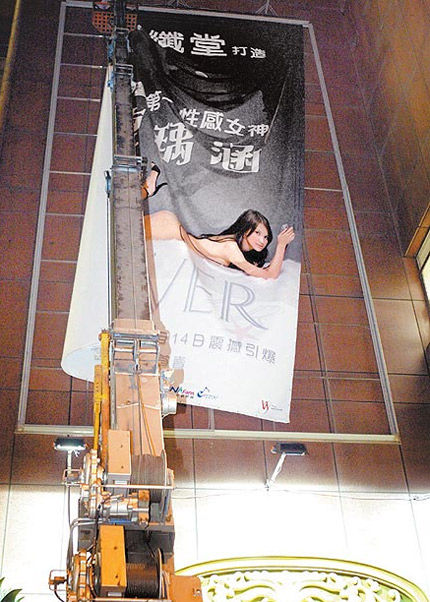
[in translation]
The media are supposed to have the sacred duty of monitoring the conditions, satisfying the right of the people to know and communicating culture. But many media are now playing the role of delivering results to clients. They are more interested in swatting the flies than attacking the tigers. The essential principle and operational standard for chief editors, editors and reporters are never to touch any government units higher than the local levels and to let the advertiser clients become the "bosses" behind the scene.
I remember that in October 2002, a laid-off worker in Xian named Guo Min gave birth to a female baby at a certain provincial-level hospital. In the health status report for the baby, the word "good" was entered. Two hours later, Guo began giving milk to the baby and all was normal. She was enjoying the bliss of a mother after feeding four or five times on the first day. But on the second day, things turned for the worse as the hospital informed the family that the baby was in a critical state due to bleeding. The family was incredulous. They wondered if the baby had been dropped on the floor and they demanded a medical examination, which was turned down by the hospital. In order to save the baby, the father was forced to sign an emergency notification paper. Two days later, the baby passed away in the middle of the night.
The husband Zhao Fei did not want his wife to grieve too much, so he arranged for her to return home as quickly as possible. Several days later, the husband went back to the hospital to demand an explanation and he insisted upon an autopsy in order to determine the cause of death. But the hospital said that the body had been cremated and even the ashes were gone. The family was perplexed and contacted several media outlets. But all the news reports written by the reporters were suppressed by their superiors. Through the introduction of the reporters at two newspapers, the family contacted me.
During my investigation, the various hospital departments were evasive at first. Then they diverged with respect to the medical state as well as the disposal of the body of the baby. The reporter went to the crematorium and the documents there showed that the hospital did not sent over any bodies this past month. So did the baby just evaporate into thin air? This was just a series of question marks.
Based upon the unique nature of this case as well as the pervasive unprofessional and unethical conduct at hospitals, the article titled <In search of the lost child> was featured at my newspaper (which I will not name here). There was going to be follow-up investigations, but then I received instructions to cease and desist.
It is no secret that the media "are collectively silent." The funny thing was that right underneath my long article in the newspaper, there was an advertisement from that provincial-level hospital in bright red headlines right below. According to information, the hospital spent 200,000 yuan to have their advertisement in the "special report" section. It was obviously ridiculous to criticize the hand that feeds you. The follow-up reports were aborted.
The advertising clients' investment amount and attitude are obviously a bargaining chip over the investigative journalism. It is an invisible shield. Clearly, I don't imply that every advertiser is a crook, but advertising is achieving the dual goal of promotion and protection.
At a time when there is heated battle for advertising, "collective silence" is a disease. This kind of non-journalism will become more intense as media become more commercialized. When the media benefit financially, they lose their voice; meanwhile the media that did not benefit will "go wild on the attack" in order to force you to make them the offer to "go silent" as well.
To say something that is frank but disheartening (which the reporters on the society beat must know), which newspaper editorial department does not have a list of advertising clients who must be "protected"? These are the taboo zones for the reporters.
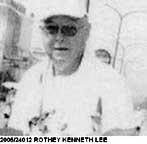

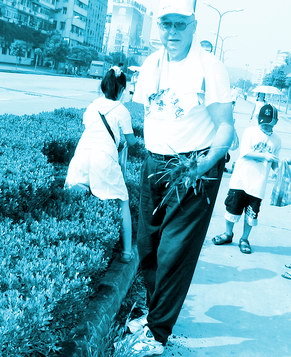
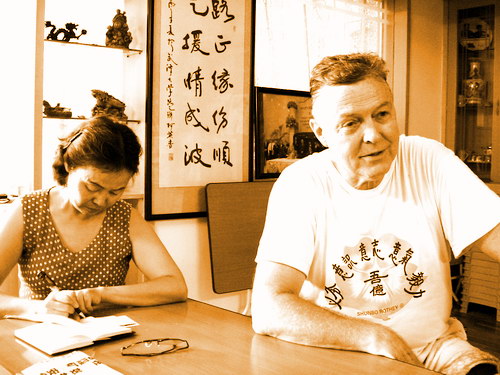
[in translation]
We have 162 million Internet users in our country, being second in the world in terms of total numbers.
On January 23 this year, the Chinese Communist Party Central Political Bureau held its 38th group study session and the main theme was: "The development of global network technology and the construction and administration of Internet culture in China."
More and more information shows that our times demand our leaders to learn about the Internet and be able to direct it. For the various levels of government party officials, the Internet is a new platform to serve the people as well as to understand public opinion.
"The Safety Supervisory Department has the responsibility to investigate all safety-related stories in newspapers and on the Internet. On June 16, State Safe Production Supervisory Department director Li Yizhong said so at the Second "Safe Development" Forum.
A short while ago, Shanxi provincial governor Yu Youjun summarized the "illegal brick kilns" affair by saying that one of the important cause as well as lesson is that they did not deftly understand the public opinion on the Internet and in the media and therefore did not make timely accurate responses. "On one occasion, I called more than a dozen provincial and local officials. I asked them, 'Did you read the Internet reports?' They all said no." It can be said that the case got a lot worse because the officials were ignorant about the Internet. Therefore he asked all Shanxi departments to pay high attention to Internet opinions and improve their ability to respond to and solve problems in this Internet age.
Central Party School professor Shen Baoxiang said that the Internet is challenging the government and party officials to have new ideas, to face up to public opinion and to come up with new ways to do things. From SARS to the Songhua River pollution to the "illegal brick kilns," people can see that the government's crisis management efforts will be much less effective (or even counterproductive) when they try to seal, block and cover up. Instead, they must disclose information immediately and stay ahead of public opinion to be pro-active.

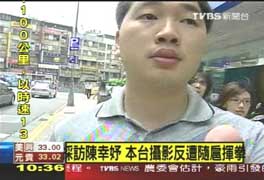

Rumors are most afraid when the government publishes the information. As Milton Friedman said, "Let the truth fight against untruth. Who has ever seen the truth lose in an free and open battle?" The 2.8 million SMS used in Zhanjiang to dispel the rumors was an example of success.
The first that the government should do about rumors is to release all the relevant information and compete against the rumors. They should not do what was done in Jinan, where the female netizen "Red Diamond Empire" was arrested. In that case, the first thing that the government did was to figure out who spread the rumor and go after the person. When a government goes about the rumormongers, they are wasting valuable time in dispelling the rumors themselves and they are only increasing suspicion that there are secrets.
In emergency public incident, the government officials need to listen to the voices of the people and then they can get instant reading on the content and movement of the rumors. Rumors only cause damage within a certain period. Aftewards, the rumors disappear but they will have already damaged the public interests as well as trust in the government. In modern society, the government has many ways releasing information: newspapers, radio, television, Internet and SMS. The government should use all the rapid communication methods to race ahead of the rumors. To lock down information and apply high pressure to prevent people from talking, or to adopt a laissez-faire policy with respect to rumors would be the natural enemy of the public interest and the best friend of the rumors. This is the greatest revelation from the rumor-cleaning SMS incident in Zhanjiang.
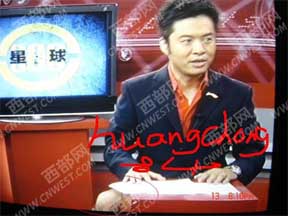
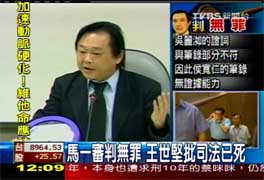
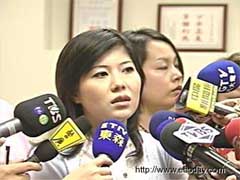
A total of 1,340 people, 367 of whom are mentally handicapped, have been rescued from forced labor since the notorious brick kiln forced labor scandal came to light in June, a joint investigation group reported on Monday afternoon.
During the crackdown on illegal kilns, mines and workshops, 277,000 work units with 12.67 million workers were inspected, said Sun Baoshu, Vice Minister of Labor and Social Security and head of the investigation group, which represents the Ministry of Labour and Social Security, the Ministry of Public Security and the All-China Federation of Trade Unions.
Police found that 67,000, or 24.2 percent of the kilns, mines and workshops inspected nationwide were operating without licenses.
They registered 185,000 cases during the inspection, more than half of which concerned employing workers without contracts and, in 37 percent of the cases, the owner failed to provide workers with social security insurance.
One hundred and forty seven people were arrested and 98,000 work units that used uncontracted workers were ordered to sign the contracts with 1.5 million workers and pay overdue salaries and compensation totaling 130 million yuan (17 million U.S. dollars).
86,395 work units (including 4,861 brick kilns) employing 1,920,000 persons were inspected,. Of these, 36,286 units (or 42%) were unlicensed, involving 340,000 workers (or 17.7% of all workers). Of the brick kilns, 3,186 (or 65.5%) were unlicensed employing 81,000 persons (or 63.3% of all brick kiln workers). 17 brick kilns were involved in serious criminal activities, including 13 unlicensed kilns that were illegal using child laborers (the youngest of whom was 13 years old).
359 migrant workers were rescued and properly returned home. 121 mentally handicapped pesons were rescued.
69 persons were prosecuted, and 96 party cadres and civil servants were disciplined.
On June 5, Dahe Net published <400 fathers cry bloody tears for help> asserting that 400 fathers were seeking their lost children. The public security bureau contained the author Xin Yanhua to obatin the relevant information. It turned out that she did not have the list of 400 fathers, she did not personally participate in rescue efforts, she did not investigate on location and she did not collect detailed data on these fathers. The 400 figure came from the lists compiled by several of the parents. By cross-checking the lists, the public security bureau found out that these was a great deal of overlap.
In the report, <The Evil Road of the Illegal People>, there was an 8-year-old workring at a brick kiln. This report was cited by national and international media. The public security bureau investigated the case and found out that the 8-year-old was a 12-year-old who followed his father around. Seven years ago, the mother left after a divorce, and so the son must follow the father wherever he works. In this case, the 12-year-old was playing at the work site while his father worked.
On July 28, an essay on Jingchu Net reported that 400 migrant workers from Enshi (Hubei) were waiting for rescue in Shanxi brick kilns. Based upon investigation, there were 851 migrant workers from Hubei working in Shanxi brick kilns, of which 531 were from Enshi and worked at two brick kilns through introduction by relatives and friends. The public security bureau investigated the two brick kilns and found that the papers were in order but no forced labor.
Related Link: Kidnapped and sent to the mines - the Wei Wenlin affair Joel Martinsen, Danwei
The Government Information Office announced recently that on account of the lack of international support for Taiwan and the long-term international blockade by China, they intend to invest NT$2 to 3 billion to establish an unofficial "Taiwan International Channel" in the manner of other international television channels such as BBC and Al Jazeera. The channel is expected to be established formally next year.
Using satellite television for international diplomacy is indeed an international trend. According to information, at least 28 nations around the world have international channels that are shown overseas. In the Asia-Pacific region, Japan, South Korea, mainland China, Myanmar, Singapore and others have international channels.
Yet, if the purpose of the international channel is to break down the predicament of being internatinoally blockaded audio-visually, then it is shorted-sighted as well overly optimistic. Many of the international channels cannot go beyond the selling of national images. Most of their news contents are either translations of domestic news or just international news segments taken from overseas or domestic news agencies. This type of assembled content lacks any point of view and do not meet the needs of overseas viewers. They are as effective as advertisements that are instantly forgotten.
But even if the Government Information Office "gets the inspired idea" of seriously emulating the examples of the two well-known and influential international channels (BBC and Al Jazeera), they are ignoring two problems.
First, any influential international television channel cannot be restricted in promoting or selling a single national image. The reason why the news on these channels are adopted by the international media and their views can affect international opinion is precisely because they will not service designated political positions. Based upon humanitarianism and professionalism, BBC famously took an opposite position to the Blair cabinet over the war in Iraq. Although Al Jazeera has a "strongly favored Middle East viewpoint," its policy is to be "situationally objective" in order to be insulated from any single national or government interest. The Minister of Information has said that the purpose of the Taiwan international channel is to oppose China and break open the international blockade. It is self-contradiction to have such a clearly defined political mission while claiming to have an independent channel.
Secondly, it is not easy to have a sustainable international channel. It requires the long-term investment of money and people with clear policies and production resources. BBC World is a commercial subsidiary of the BBC group. It relies on overseas advertising revenue and cable/satellite subscription fees. It has a global staff and resources established over a long period of time, with the excellent BBC news brand to support it. Yet, it still lost 12 million pounds last year. Al Jazeera relies on advertising revenue, but it is still a losing business that requires several tens of millions of American dollars in aid from the Qatar government. Whether they make money or not, they at least have the goal and means to continue business no matter what.
Meanwhile, the international channel planned by the Government Information Office will receive NT$2 to 3 billion in the first year and it will begin operating within one year. But what happens after the first year? If they want to wait and see, then it will surely turn into a catastrophe.
If the Government Information Office did not forget, they proposed a public television plan two years ago with the stated goal of having an overseas international channel after establishing a public television group. This is a plan that is better suited for the stated goals. The Government Information Office has now abandoned that plan. Apart from proving that it is incompetent, this also means that either they want to have a different structure which is easier to control or else they are just signing checks for election purposes.
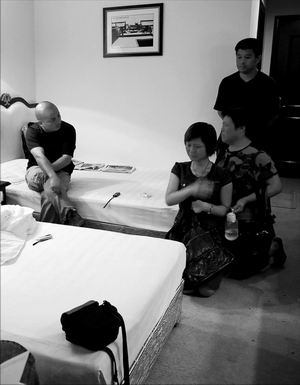
It has been over twenty days since "7.18" and Jinan is recovering from the disruptions due to that rainstorm. Both the government and the people want the pain to subside, but they obviously have opinion differences on how to heal. The government has not published the list of victims, they have not conducted any public memorial services and they have given no sign of offering apology or compensation. They obviously want the matter to be quietly forgotten. Some family members of the victims want fair treatment. Last week, the family members of two victims got three Beijing lawyers to sue the local government.
Earlier rumors said that the three lawyers went to Jinan on behalf of the netizen "Red Diamond Empire" who was detained for "spreading rumors." Right now, "Red Diamond Empire" appears to have voluntarily or involuntarily chosen to keep in step with the government because she is silent as well. But it seemed impossible that silent forgetting will work in this case. The Ginza Shopping Plaza is presenting renovating and will re-open shortly to the public. But the public will not forget so easily.
The Ginza Shopping Plaza is one of the victims of the rainstorm and it sustained considerable financial losses. Even more unfortunately, it became the target of public condemnation because it called the police to complain about "Red Diamond Empire." When it first called the police, its motive was to protect the corporate image. In the words of its chairman Wang Renquan, certain netizens were spreading rumors that there were drowning deaths at the plaza and "caused a great deal of negative impact on the corporation." He did not imagine that the image of the corporation would get a whole lot worse after the detention of "Red Diamond Empire," to the point of having an Internet public campaign to boycott the place. In the even longer term, the "Red Diamond Empire" affair will become a classical case in any discussion of freedom of expression in China, and the Ginza Shopping Plaza will have a permanent negative image with respect to this case.
Normally, when a shopping plaza finds that its image is being tarnished by rumors, the first option is to tell the truth to the public and use transparent information and sincerity to win the public's trust. The second option is to sue in court and let the judge decide whether this was defamation. For a retail corporation that faces the public, the second option is not a good choice and should be avoided if at all possible. Yet, the Ginza Shopping Plaza skipped both of these options and chose a third option -- they called the police. Please notice that they did it not because the rumors caused or may cause public disorder, but because they want to protect the corporate image. This is strange enough, but what is even stranger is that the police actually detained "Red Diamond Empire" who was one of the participants in the Internet discussions. The story gets even stranger in that when public opinion was roiling over the police action, the Ginza Shopping Plaza ignored the public feelings and openly supported the police. Wang Renquan said, "The detention of this netizen by the police is not a violation of the civil right to freedom of expression." Faced with the Internet talk of a public boycott of the Ginza Shopping Plaza, is this how the chairman protects the corporate image?
In the public relations crisis, the Ginza Shopping Plaza relied on public authority (to the point of even using it to intimidate the public), they ignored public sentiments (to the point of not bothering to communicate with the public), they used silent evasion to deal with the boiling public opinion and they hoped that people will forget -- the characteristics shown by the Ginza Shopping Plaza in this incident are so similar to the bureaucratic style in government departments ...
What is the purpose of this tactic?
One theory would be to make the public angry with all the
inconvenience. Then the public will seek information about the
workers' issues and they will sympathize with the worker. This
groundswell of public opinion will force the government to lean on the
construction industry to settle with the workers. The other theory is
that the public will be angry with all the inconvenience and direct their
rage against the workers. There will be public demand for the police
to enforce the law and the government not to succumb to blackmailers who are
trying to hold the public hostage. The construction industry will be
very happy with this result. So which theory happened? What is
the public opinion? If not, what are the newspapers saying?
Apple
Daily only has some photographs, it reported the events but it gave
no opinion.
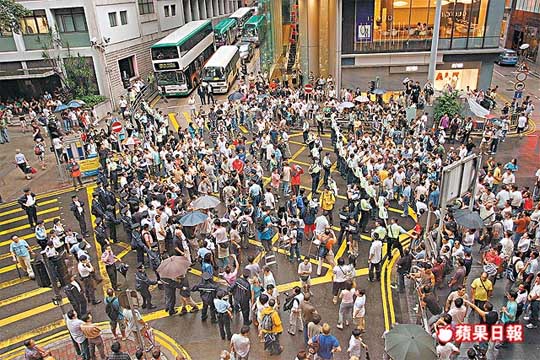
Ming Pao
had an editorial that is reminescent of the law-and-order speeches of
Richard Nixon/Spiro Agnew.
Some metal workers were negotiatingfor pay increases and work hour reduction with the construction industry. When their demands were not fully met, they chose to disrupt public order in order to force the government to interced and pressure the construction industry. It is the right for metal workers to ask for pay increases and work hour reduction. But most citizens will not agree with using the disruption of public order as the means.
Yesterday, about 700 metal workers arrived at the Central Government Offices and demanded to see labour minister Matthew Cheung. When they did not get their wish, they blocked Queens Road Central. Although this was a Saturday afternoon, nineteen bus lines had to be re-routed and many citizens were inconvenienced. Citizens criticized these metal workers and expressed their disapproval.
On the day before yesterday when the Number 8 typhoon signal was hoisted, citizens were rushing home. About 300 metal workers attempted entered to enter the Yau Ma Ti MTR station and wanted to go to the Central Government Offices to petition. The police blocked off portions of the street and the MTR station to prevent the workers from entering. Traffic fell into chaos in the area, and the citizens who were inconvenienced were also complaining.
... In recent days, many labor organizations and legislators have interceded. There is no evidence that the increasingly sharp actions of the workers were due to incitement by others ... Based upon what happened on the past two days, the metal workers appear to have lose their direction. There is nothing wrong with labor unions or politicians helping the workers get their reasonable rights. But it is wrong for people to incite the workers to achieve their goals in a way that is detrimental to citizen interests and thus derive political protests during the process. Society will not tolerate it.
This case will continue to develop. The two sides will meet against tomorrow. If the metal workers calm down and resolve this matter through rational discussions, that would be ideal. But if some workers continue to ignore the law and create trouble, we believe that the police should not tolerate this anymore and they must seriously enforce the law to stop this lawless phenomenon. In recent years, there have been frequent assemblies to cause trouble; after a while, some people think that if they have numbers, noise and tough talk, they can get anything they want. It is unacceptable for public authority to go missing. The rule of law is the cornerstone of Hong Kong and it is a core value of Hong Kong. The government should enforce the law in a timely, appropriate and reasonable manner, so that all of Hong Kong will value the rational and orderly environment.
The Sun has the front page cover with the headline: "Central out of control."
Here are the photos:
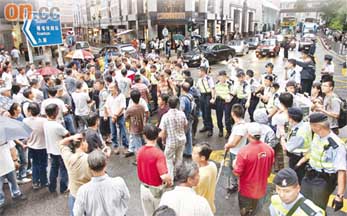
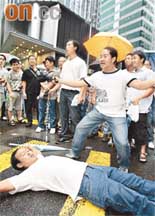
Whereas Ming Pao's editorial was vague about the so-called politicians involved, Oriental Daily (no link) named names ("政客搞亂檔失市民支持"):This was a simple labor dispute until it became a political wrestling match among the Hong Kong Confederation of Trade Unions, The Hong Kong Federation of Trade Unions, the Neighborhood & Worker's Service Centre and "Long Hair" Leung Kwok-hung to win votes.
The pro-Beijing Hong Kong Confederation of Trade Unions accused the pan-democratic trade unions of "hijacking" the workers. Their Metal Workers Union (part of HKCTU) secretary-general Fung Kin-chau said that negotiations have been going on but the Hong Kong Federation of Trade Unions and Leung Kwok-hung "jumped the queue" and "seized the attention of the cameras" for political reasons. He said that they had nothing to do with the workers showing up to demonstrate at Government House on Friday because they were negotiating hard at the time. The excessive action of the workers had nothing to do with them.
The pan-democratic unions said that they entered because the HKCTU was ineffective in its negotations. The assistant to Leung Yiu-chung, the Legislative Councilor from the Neighborhood & Worker's Service Centre, said that nothing has come out of the negotiations held between the HKCTU and the industry representatives. They received a request for assistance from the metal workers and therefore they took collective action to apply pressure on the industry. The blocking of traffic on Ice House Street yesterday was a spontaneously action. "The union cannot control what individual workers do. This does not pertain to us."(SCMP)
Construction Industry Bar-bending Workers' Union, a subsidiary of the Federation of Trade Unions (FTU) which has been representing the workers in the negotiations, said it did not support the actions taken on Saturday. "There were some irresponsible unions who provoked the workers into taking extreme action. We were unable to stop them and I must apologise for that," the union's chairman, Luk Kwan-ngai, said.
However, the construction site workers' branch of the Confederation of Trade Unions (CTU) said Saturday's events were not planned. The branch's deputy organising secretary, Shek Lam-sang, blamed a lack of organisation which resulted in the workers being left on the street for hours. "We were not the organisers. We were called in to help when workers' felt that their requests were not answered."
Related Link: 發生在工人坐在皇后大道前… … 遊牧視野
“Freedom is not a concept in which people can do anything they want, be anything they can be. Freedom is about authority. Freedom is about the willingness of every single human being to cede to lawful authority a great deal of discretion about what you do.”
More at: Mayberry Man Peter J. Boyle, The New Yorker

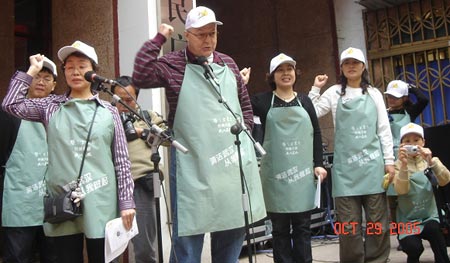
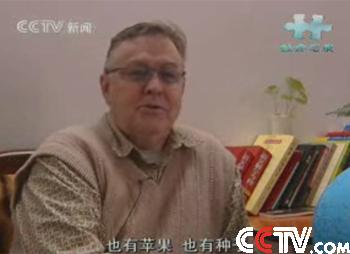



Kenneth Rothey, 64, a local immigration attorney and owner of Rothey Law Firm in Houston, was indicted in March on charges of visa fraud, money laundering and encouraging Chinese nationals to enter the U.S. illegally. If convicted, Rothey faces up to five years imprisonment for each of the nine counts on charges of encouraging unlawful immigration, 12 counts of visa fraud, and various money laundering charges relating to the financial transactions conducted with the proceeds of $267,000 of money paid to him by the Chinese nationals.
... The indictment alleges that Rothey, Golfarini and Chapa filed frivolous immigration petitions by creating the illusion that there was an affiliation between specific Chinese and U.S. companies. The three were charged with sending fictitious immigration petitions to the Texas Service Center (TSC), which is part of the Office of U.S. Citizenship and Immigration Services (USCIS).
The defendants purportedly employed these Chinese nationals at one of eight local businesses as intra-company transferees or executives. They completed fictitious immigration forms and acted as petitioners on behalf of the Chinese nationals. After entering the United States, those seeking to gain employment also thought they could ultimately adjust their status to remain in the U.S. Each Chinese national was willing to pay as much as $100,000 for immigrant visas and work authorization documents.
So is Lu Qi the wanted criminal suspect Kenneth Lee Rothey?
(CCTV) The CCTV reporter said that Lu Qi had denied that he was not the wanted suspect. Lu Qi had shown that reporter certain identification papers, which contain the same names and birthdays as the wanted suspect. When the CCTV reporter spoke to Lu Qi, he said that he neither admitted nor denied that he was the wanted suspect. Lu Qi said that someone in Guangzhou has been stalking him since 2005. Lu Qi said that he monitored his blog and found out that two persons (including from from Shanghai) reads his blog every day and they keep attacking him. He said, "These attacks are useless. The Chinese government will not expel me because of what some nobodies say about me. I am not afraid to confront the chages in the United States either. I am a good friend with a senior-ranking police officer in Hubei province, and he has never investigated me."
According to Lu Qi's Chiense wife: "We entered China from Hong Kong in December 2005. My husband filed formally for retirement last year. The US government cares about my hushband. We receive social security pension payments ever ymonth. No one has sued him since he retired in August 2004 until he entered China. The Texas and Utah Lawyers Associations were the supervisory agencies before he required. They can prove the case, and they are the most qualified people. The American legal system is relatively perfect and does not convict anyone based upon speculations and rumors."
(Life Is But An Empty Dream ...) May his soul rest in peace.
Regret usually comes after a loss occurs and before the fear settles in.
In 2005, a certain squeaky voice that had been around for the last several years went missing among the press covering the two Congresses. But he "even" noticed that. When he returned to Hong Kong, he asked me: "Why didn't you go up there?" I told him everything about my mother: Her operation was pending and I could not leave her.
Perhaps because he had the same problem, he was really concerned. Over time, he fed me all sorts of information about diet and cures for cancer, and he told me how to prevent recurrence. Whenever I see him afterwards, he would follow up about the condition of my mother. When he heard that she was alright, he would nod and tell us to keep working hard.
After trying the mythic fungus 靈芝孢子, the resistance improved. So he called me immediately to buy some for my mother. He said that 2046 was the real thing. At first, I ignored him because the fungus was too expensive. After he reminded me enough times, I actually bought some for my mother to try. That was how the mythic fungus 靈芝孢子 at home came about.
When I went to work for another newspaper (note: Apple Daily), I told him about the "bad news" inside the Legislative Council building. As expected, he knitted his brow and turned his mouth up. He asked me why. To make money, to change the scenery, I told him more or less truthfully. But you won't be able to gather news in mainland China anymore? So once again he "even" perceived my greatest misgiving. I said that I needed the money and I had no choice. Since the answer seemed genuine, he did not probe any further. He added that I can always contact him as before. When I heard that, I was moved.
He kept his word. When I asked him for interviews afterwards, he always accepted. I know that that are certain obstinate people in his party who were not happy with the fact that he did not distinguish friends and enemies among the media. Therefore, each time, he reminded me: "Please be careful. Do not distort because I could be in big trouble ..." I am grateful that he used his actions to demonstrate his trust in me.
Life at Zhudao Hotel was very boring. During our chats, I said several times that I would visit him when I was free. Each time, he was delighted and said that there are many small restaurants on the main street that are worth exploring. He also listed some places that should be visited. Regrettably, this promise was never realized: a single sentence "June 4th was not a massacre" drew us apart by a long, long distance ...
He was a good person rarely seen in politics. He was seldom conniving and scheming. I hope that those people who took his June 4th comments to heart can spare him now that he is gone.
May his soul rest in peace. May all those cancer sufferers be healthy.
(Our Ridiculous Thoughts) Mourning.
We only met once in May after returning from Beijing to Hong Kong. That was the tea session that I would rather not have gone to.
The tea session was originally scheduled on April 11, which was my birthday, but it was ultimately canceled. The date was changed again and again until it took place on May 15. Sometimes, I wondered if the tea session had not been re-scheduled, then those unkind words might have stayed inside you, the citizens would not have rose up to deplore you, your DAB brothers would not have whined about you, and you ...
would not have left us so soon.
In 2003, circumstances caused me to become a political newspaper reproter. I had not yet settled down when I witnessed the big losses suffered by the DAB in the district council elections. You became the DAB chairman and that was how we got to know each other. You had scolded me, who was just a rookie reporter, over the telephone: "How can you even asks these questions? How can you be a reporter?" When I handed my business card to you in person later, you said: "I remember you! I scolded you before!"
Yet we got to know afterwards and we had photographs taken at the Ritz-Carlton Hotel. During the two Congresses each year, we would "barge" into your hotel room to chat. On one occasion, we even advised you not to run for the Legislative Council but you ought to continue to run for the National People's Congress in order to retain your current "medical coverage." When you went to seek medical care in Guangzhou, we visited you privately. You opened the door and the first thing that you said was: "You still come even though it is raining so hard?"
So that was how the four years were.
[in translation]
In the past, I seldom go and read my own blog. Recently, at the advice of friends, I went on the Internet to see how people react to my blog posts. The Internet is really a good thing because people can say what they think from their hearts and everybody is equal to each other. This cannot occur in other situations.
Recently, I published an essay titled <You can speak for the rich, but you do things for the poor>. There are some who agreed with the essay and there are others who criticized it. That is nothing unusual. But there were two completely different types of comments in terms of tone and style. First there were the curses, which are usually short and terse with just one or two sentences. That accounted for one-quarter of the comments. Then there are the rational discussions. The phenomenon of cursing people is worthy of analysis, because it can tell us many things.
Here are some examples of curses: "You go and drop dead!" "May the Lord of Hell torture you!" "Are you really your mother's child? Why are you so fucking horrible?" "Go eat shit!" "An old dog!"
These sentences are quite short, but they carry some important information.
First of all, the people who say these things are most likely less educated and cannot use analytical reasoning to persuade other people. So they say something very short to let off steam. Actually, they may object on reasonable grounds, but they find it hard to organize their thoughts and they cannot fully articulate what they think. When they encounter bullying in real life, they have the same problem with trying to argue rationally and so they often employ violent tactics too. Internet cursing and mob violence have the same origins -- their fists are stronger than their brains.
Actually, they must have felt strong discontent for them to use the vilest of words. In truth, they may not really want me dead. More importantly, their discontent with society has almost reached a point of explosion. If such explosive feelings exist widely, then it is a signal for danger. If there should ever be social disturbances, it would hurt everybody including the grassroots elements of society. Throughout history, all rebellions depend on the mobilization of the grassroots. A rebellion is one group of grassroots attacking another group of grassroots, and it is always the grassroots who are victimized. Those who gain are the smart people who know how to use and manipulate others. Ordinary people do not understand the lessons of these experiences. They are easy to incite, they act rashly and they are readily deceived to become cannon fodder.
We have to ask why so many people will not think rationally and instead go to the extreme with their explosive feelings? This has to do with our elementary education. In our elementary schools, we are still teaching the same old stuff about class struggles; we praise heroes who emerge from the class struggles. There is also unprincipled patriotism, which says that anything that our nation does is right. There are no principles of justice and universal love. We advocate struggling to fight for a simple goal and we oppose any doubts and creative ideas. This sort of education is carried all the way through university. If the teacher should depart from this line in classroom, he/she may be sanctioned, or even sent off for labor reform. The result of advocating an education based upon blind obedience may be the opposite of what was hoped for.
Our elementary education does not teach people to respect others as well as oneself. Never mind what is in the books, because it comes from practical life too. During the Cultural Revolution, only the Leftist ideas were correct and this type of correct thinking has not been purged yet. That is why we have the habit of cursing people. Many elementary school teachers belong to the generation which grew up during the Cultural Revolution. Their words and acts influence the next generation. We may have negated the Cultural Revolution, but we have not gone through a full criticism of Cultural Revolution That is why we are still suffering today.

[in translation]
On August 7, there were two pieces of news about broadcasting people which together make for interesting reading.
One of them is the essay in China Youth Daily by CCTV commentator Zheng Genling who deplored the Internet for always "demonizing" CCTV, including the case of Hai Xia's "Explanation gate." He believed that certain media people are rash when they want to spread rumors, even to the extent of ignoring the basic requirement for journalistic accuracy.
The other is the reappearance of Guangzhou broadcast host Chen Yang after being away for one month without explanation. This quelled the various rumors swirling about his 'disappearance.' Chen explained that he swallowed a fish bone and therefore had to take time off to recuperate. He said that he had not been forced off the air by special pressure.
Let us first talk about the Chen Yang affair. Why should the normal leave taken by the host of a local broadcast station be the subject of so much speculation in society to the point that it became a public incident that drew media attention? That was because Chen had a sense of justice with respect to the ills and evils in contemporary society, and he had the art of language that was perceptive but reserved. Has Chen Yang ever misspoken? Has he said something wrong before? For sure, but the Guangzhou audience did not launch an attack on him and they did not "demonize" him. They forgave his minor mistakes for the sake of his fight for justice at the grand scale. They even raised it to the level of "Chen Yang style humor" and enjoyed it.
Meanwhile, while are people so demanding on CCTV, even to the point of demonizing it? In recent years, there have been so many scandals coming out of CCTV. People like Zhao Zhongxiang, Zhao An and Yang Yichao were all the male principal characters in scandals that roiled society. Who was "demonizing" them?
Something has to be rotten first before the maggots appear. You cannot blame someone else. All of that is actually secondary because the public discontent against CCTV has a deeper reason. CCTV news is detached from the masses, they use clichés and lies and their hosts are cold, stiff and expressionless. The public has been unhappy with them for a long time. Forget about anything else, but comments such as "the disaster victims were happy as if they were enjoying Chinese New Year" had occurred many years ago. Today, there is the Internet platform and the viewer opinion can be broadly distributed. Therefore, if Hai Xia was treated unjustly, then it was because other people maligned her.
CCTV is a top brand and has always been the target of demonization. As a CCTV worker, I am "logically" criticized during meetings of friends. Recently, these types of "criticisms" have moved onto the various media. Two outstanding examples is the Hai Xia "Explanation Gate" affair and the CCTV layoffs of temporary workers.
Behind all this, it shows the brash way in which certain media people "logically" report rumors without any respect for journalistic accuracy.
Take the case of Hai Xia's "Explanation gate." This was about the feelings of the reporter live at the scene of the diversion of flood waters at the Wangjiaba dam. But netizens used it to target Hai Xia, who is a well-known television hostess, because that will draw more attention and make the demonization more effective.
I watched the video of that broadcasts several times. First, the reporter at the scene said; "Since the clean-up of the Huaihei River in 2003, there has not been any floods because the weather has been good. The Wangjiaba dam was not opened. Therefore, on this occasion, the masses felt that this was a festive occasion like the Chinese New Year. They all came out to watch the flood gates open." Hai Xia then asked: "The people are watching the flood gates open at the dam like it was Chinese New Year and they sense a great change is happening. Is this so?" A keen observer will note that Hai Xia was skeptical about what the reporter said and she was trying to remind the reporter's judgment about "Chinese New Year." But the reporter failed to understand and said "Yes" with confidence instead.During this broadcast, there was no view of Hai Xia. The picture was either the reporter or the flood gates, and the sound was Hai Xia's worried words. How can people say that "Hai Xia said somewhat excitedly with a smile on her face"? I asked the reporter and he said that the "Chinese New Year" judgment came from some of the local people as well as his personal sense at the scene. The fortification of the dam in 2003 made local people loved from the lowlands to a relatively safe place. The section of the land that was swamped by the released flood water had no inhabitants, and the government has promised to compensate the farmers for any crop losses. That is why they did not have the feeling of hurt as the netizens who attacked Hai Xia had.
Meanwhile, on July 30, Yangchang Wanbao carried a report from Hong Kong's Tai Kung Pao about CCTV laying off temporary workers as a result of the "cardboard buns" affair at Beijing TV. This explosive piece of news drew strong reactions inside and outside of China . Many more media went in and hyped it up even more. Yet, as far as I know, this was another piece of "fake news" in the manner of Hai Xia's "Explanation gate."
Why is this a piece of "fake news"? CCTV had been getting rid of the temporary workers long before the "cardboard buns" affair. The direct cause was the <Labor Contract Law> that will go into effect on January 1, 2008 to regulate employment. Since various departments had been employing people without regard to regulations, CCTV decided to get rid of the temporary workers. By concidence, this action occurred when the "cardboard bun" fake news was exposed. Certain media did not care about the truth and they just directly linked the two totally unrelated matters into a cause-and-effect relationship.

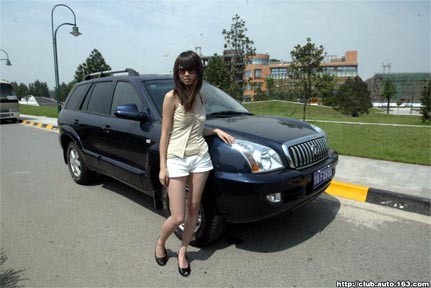




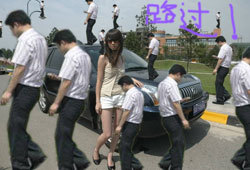
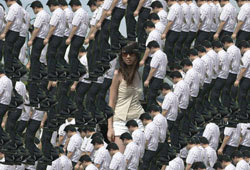
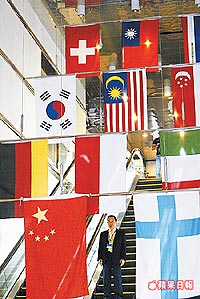
[in translation]
Yesterday, nine Hong Kong newspapers (including Ta Kung Pao, Wen Wei Po, Sing Tao, Hong Kong Economic Times, Oriental Daily, The Sun, South China Morning Post, Hong Kong Daily News, Hong Kong Economic Journal) all carried a report about an interview with Standing Commission on Civil Service Salaries and Conditions of Service chairman Nicky Lo Kar-chun. The contents of the reports were more or less identical, as Lo revealed that Salaries Standing Commission intends to review the structure of public services wages and he also discussed certain controversial aspects of public servant salaries. In itself, this is not a big news item, but the public (especially the taxpayers) might be interested to the extent that certain public servants may be receiving wages.
Ming Pao did not have a corresponding report, so that its readers have no way of knowing the policy direction of the Salaries Standing Commission. We believe that it is normal for the media to go for exclusive news. However, when a news item is of interest to many citizens, the relevant party should have notified all the media for its tea or chat session so that everyone has equal opportunity.
Yesterday, our reporter followed up on this matter. The Civil Service Bureau said that they did not intervene in the interviewing arrangements of the Salaries Standing Commission, while the Salaries Standing Commission said that this particular tea session was arranged as demanded by those media. But our understanding that at least one of the nine newspapers present did not ask for an interview, but was notified to attend all the same.
People who are familiar with news operations know that whenever the government or Civil Service Bureau need to evaluate the salary of individual civil servant salaries, the Salaries Standing Commission will normally begin the evaluation. But why did the Salaries Standing Commission not arrange for Nicky Lo to hold a press conference and use the normal channels to publish the fact? Why did they chose certain newspapers only for "special information"? Why did they choose those nine newspapers and not the others? We don't know. It is not certain what the other newspaper not present think (note: Apple Daily, The Standard, etc). As far as Ming Pao is concerned, we believed that we were shut out from the news, and this is an infringement of the freedom of press. We will watch how things develop and we will use appropriate measures to defend the freedom of press.
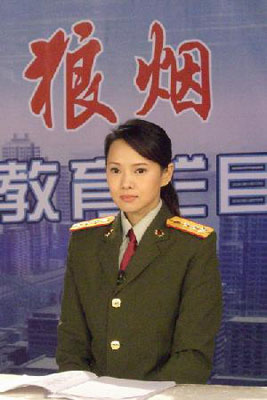
Here is Annie Yi's blog post in translation:
My manager sent me news from Taipei
I am only going to say this once
What the netizens said about my maternal grandfather is wrong
He was not killed by mainland Chinese soldiers
I must say that this affair caused great terror for my mother
And it obviously impacted me.
My maternal grandfather Mr. Yang Yuanding was wrongly framed as a Communist spy and executed by the KMT people
The adults around me all expressed sorrow about the death of my maternal grandfather
However, they were scared of the white terror at the time and they refused to have contact with our family
They were scared of getting involved.
I am now an adult
I know very well that most people who are sent to fight in wars are not volunteers
Most people have no idea why they are in a battle
Politics is always decided by certain scheming careerists
The victims are the mothers who send their children to serve as soldiers
I was also an impoverished child
My success was obtained through my hard work and not by any illicit means
I have paid every cent in taxes honestly
I have designated my public donations to the children of Taiwan
As an actress, I can say that
I believe that my roles are good and honest and they will not insult people of Chinese descent
That is the most important
As for the media practice to be inflammatory, bloodthirsty, hate-mongering and noise-making,
I will not react in any way
I will not teach my children to learn to hate and choose a stance at birth
This is a globalized village
The earth is warming up, a child will die from hunger every five minutes, the rain forests are disappearing, animal species are nearing extinction
Yet humans will continue to fight and kill in the name of ethnic identity and interests
Besides this affair should be regarded from both sides with respect to any ethnic confrontation
These are two thoroughly different matters
I accept differences in opinion, and I accept being detested
But since we have freedom and democracy
I also have my rights
Please learn to respect before imposing judgment instead of just constant hatred
This is one and only time that I will comment on this affair
The media should not bother to follow up with me because I will not respond
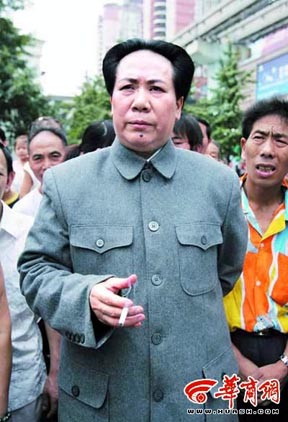
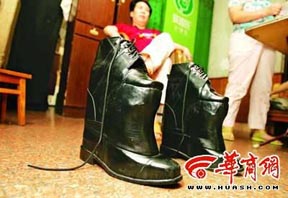
In 1982, the family planning policy was accepted as a core state policy and written into the Constitution. The policy has been enforced rigorously in China for 25 years. No other policy is as well-known as this one, because it affects every family. But like any other policy, it may be simplified and distorted during the process of implementation. The success of the policy depends on incentives, both positive and negative. In rural villages, the threat of fines is more effective that rewards and therefore punishment occurs frequently. After a while, the masses begin to think that family planning equals fines for exceeding birth quota.
When the policy is simplified this way, the slogans in the rural villages are reduced to violence as well. On the Internet, photograph albums of family planning slogans are perennial favorites. These slogans are very colloquial and easy to say and understand. But the implied violence is scary. The State Family Planning Commission believes that these slogans were too severe, stern, cold and lacking humanitarism. Therefore, they have issued a new set of 190 slogans that are more civilized.
While this is a good thing, we cannot gloss over the fact that the old slogans were created by family planning workers and reflect their understanding of family planning. Changing the slogans are not enough. It is necessary to change their working styles and attitudes.
During the past 25 years, family planning work has been focussed on "having fewer children." But family planning actually contains much more than that. However, "having few children" happens to be easier to communicate, control and evaluated. According to the Constitution, the purpose of family planning was to "make the population growth commensurate with the economic and social developments." That is to say, if necessary for the sake of economic and social developments, the state may even encourage "having more children."
Twenty five years after the family planning policy came in, certain population issues have emerged. For example, there is a serious imbalance in gender ratio; in 20 years' time, China will have 300 million single men. As another example, as the population of China ages, there may be problems with social security.
(Southern Metropolis Daily) Family planning slogans in China
If you abort when you should, we will take your house and your cow!
You beat it out, you can make it fall out, you can abort it, but you cannot give birth to it!
The Ten Yes's and the Ten No's of Family Planning
Rather have blood flow like a river than to have one more child than allowed!
I just read Roland Soong's 'survey research report.' It is the most interesting among all the essays about Queen's Pier. The interesting part is not just the survey interviewees who -- unlike the many netizens -- do not care whether Queen's Pier lives or dies, but their opinions and attitudes form a lively sarcastic comment on the preservationists who claim to represent the "masses." Out of curiosity, I decided to imitate Roland Soong and interview a few people.
The first person was my mother, who has lived in Hong Kong for over five decades. I asked: "Do you have any memories related to Queen's Pier?" "I used to, but I have not paid much attention. There is no memory to speak of." I asked again: "Do you agree with the demolition of the pier?" "What does it matter to me?" She paused and added: "If I have to remember, I would remember the General Post Office in Central." I asked: "Why?" "Because it was beautiful."
The second person was my grandmother, who has lived in Hong Kong for over six decades. But in the end, I did not get to ask my question because I spent five minutes trying to articulate my question without any avail. But I can say that when she saw the news report about the Queen's Pier tussle, she spontaneously said: "What a waste!" I think that this explains her position clearly enough.
The third person was a 20-something-year-old female friend who is a total Hong Kong native. I was in contact with her over MSN. I asked her about Queen's Pier and she said: "None of my damn business." Then she drop the subject.
The fourth person was the co-blogger 掬香齋主人. I was speaking to him by telephone about interesting things that we have recently read in books and I brought up the subject of Queen's Pier. He said: "I don't have any special feelings. I rather regret the demolition of the General Post Office. Queen's Pier was not beautiful. Besides, since Star Ferry is no longer there, there is no point leaving Queen's Pier behind." I said: "This is like someone who has 99% of his skin ripped off. So what is that one small inch skin left on the tip of this toe?" He said: "You remind me of these scoundrels who deceive innocent young girls. They tell the girls: 'Since you are not a virgin any more, why not sell your body instead?' This sounds quite persuasive."
General Post Office, 19 DeVoeux Road
Central, Hong KongThe four people that I interviewed were familiar to me. They are ordinary Hong Kong citizens, they have no political leanings, they have not gone to study Farsi in Iran and they don't care about the history of civil disobedience. They are be interested in "decoding colonialism" that some "cultural commentators" do. But it is not without risk to publish the opinions of one's family members and friends, because some people think that anyone who does not oppose the demolition of Queen's Pier must be a "patriotic element" on the same level as the Victoria Park uncles. As Leung Man-tao wrote in the essay "Time is on our side -- an open letter to Carrie Lam Yuet-ngor":
I don't blame you because many people of your generation feel that this is the leftover from British colonialism and a national shame. Not only must the pier be demolished, but it is done as soon as possible. If these people live in mainland China, they would be finding ways to demolishing the last remaining "comfort hostels" of the Japanese army.
The horror of this logic is: If you do not oppose the demolition of Queen's Pier, then your reason must be because you think that it is a national shame; if you think Queen's Pier is a national shame, it means that you are like the Victoria Park uncles. This is so logical. And if you don't think that Queen's Pier is pretty and so there is no loss without it, some netizens will say: "You make me feel that you are very feeble-minded." Therefore, I say that publishing the views of your friends and family members is quite risky. Even if these people don't analyze this via "colonialism/post-colonialism/de-colonization/collective memory," your friends and family members may be regarded as "very feeble-minded." They will be criticized for not understanding the "values and world views of the brand new generation. And, of course, time is not on your side.
Neither my own survey of sample size two nor Tom's survey of sample size four carry any statistical meaning. I wrote what I wrote not about the Queen's Pier issue, but about the general tactics of the preservationists. When all said and done, there were perhaps several hundred people who turned out at Queen's Pier to support the preservation of this heritage site. Why weren't there many more? I believe that this may have to do with the tactics. Among the many stories, there was one about a "Victoria Park uncle"-type who showed up to harangue the protestors. One female preservationist took him aside and spent hours explaining why they were there. In the end, he conceded that there was a point. So there is a way to get through and win sympathy. The point in the two non-representative surveys here is that many of the tactics were counter-productive. For example, you should not be attacking the insertion of yet another mall because mall culture is stupid. Almost 200,000 people visit the Times Square mall in Causeway Bay on the weekend, and if you can even get 1% of them to show up at Queen's Pier, the public opinion dynamics would have shifted in favor of preservationists. Instead, when you insult them by calling the mall culture stupid, you have just made sure that they will oppose you. In like manner, when some people do not consider Queen's Pier as having aesthetic merits, you should not say that they are 'feeble-minded' because you will have made sure that they will be on the other side. The point is to win people over to your side and not to antagonize them by calling them stupid or feeble-minded. This is very simple tactically but it went missing at times. I understand that a movement cannot dictate what every supporter says, but there should have been some self-corrective action.
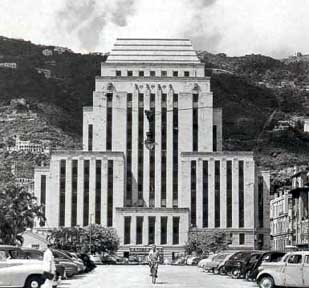

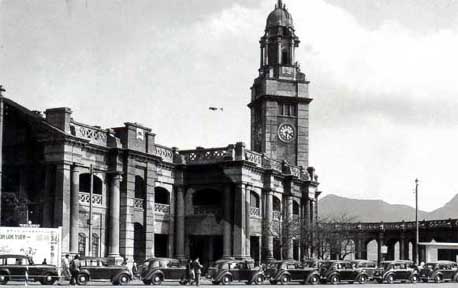
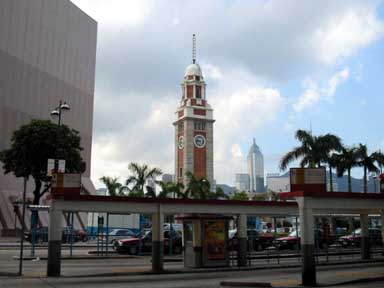
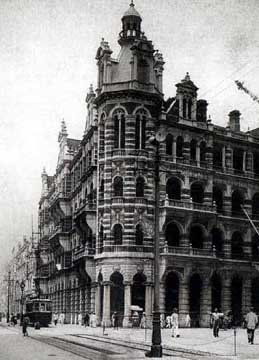


[in translation]
Recently, I was in Zhangjiajie and my roommate complained that I snored too loudly. So he stayed up to watch television. Later in the night, I was awoken by a shrill female voice. My roommate had fallen asleep and he was snoring, but he had not turned off the television set. On the television screen, a female expert -- using Yu Dan's posture, expression and convincing tone in discussing The Analects -- was explaining how a man could enlarge his penis.
Any Chinese person who watches late night television is likely to be able to see such ads. These idiotic swindles are likely to generate a lot of money, because they take up plenty of advertising time. They also showed that the television stations must not be making a lot of money, and many of them will fail without the support of these quacks. Pathetically, some of these practitioners get nervous in public because they are scared of the paparazzis.
Has it become intolerable? August 2 in Beijing News: "The State Administration of Radio, Film and Television issued a notice to the various local broadcast offices to adhere to the law with respect to these advertisements. Among the banned advertisements are the various illegal medicines and health products. But this time, advertisements that hint at sex are also banned." The reason was that these advertisements "seriously impacted the public trust in broadcast television." From the other angle, this proves that the advertisements are fake; if the penises really became bigger and longer, the "public trust" in the television stations would have been enhanced.
This should be done. In August last year, there were ban orders against breast enhancement, infertility and other fake ads. The revenue at one television station went down 60%. This showed that certain television station were built on the financial foundation of flat chests and poor sexual performances. Even the almighty CCTV was broadcasting Tang Guoqiang's famous "Guanyin Goddess bringing a son" advertisement.
There is no excuse not to ban these ads. When television stations claim to trumpet the "main theme" but their financial reports showed that their clients are mostly confidence artists, what is the explanation?
Nevertheless, even though a ban was imposed last year, the ads actually becme more and more disgusting since. I am not optimistic about this new ban either, and we may yet see another more severe ban next year. Our GDP is rising rapidly, the economic situation is bright, people like to spend money and we have practically eaten up all the pigs out there. So the television ad space should be very valuable. Yet, the television stations have to rely on sex ads. This only shows that some of these television stations are nearly bankrupt because they don't have any audience.
If the television stations really carry out the orders, I see that the only outcome is that they must close their businesses. This is not something the relevant departments want to see either.
The way out for television is to be loved by the audience because the ads will be liked and the respectable advertisers will invest. What do people like to watch? Obviously, the innovative and creative works. But when a regional television station runs a singing contest, CCTV jumps in to call it low-browed. CCTV thinks that it is high-browed with its palace dramas, which benefit from the fact that we have so many emperors in our history. If you want to make more realistic drama, then there are taboo zones everywhere. Wang Shuo recently reported that certain film review boards are corrupt because they won't give approval unless they get bribes. Are could such television shows be good? If not the sex ads, what else can they rely on? Will you charge the government/party leaders money for broadcasting news reports about their meetings?
While it is right to ban fake ads, the television stations should be given more leeway to stay alive.
Former Labor Department chief Zhu Junyi estimated that he received in excess of 10 million yuan in bribes. He said that he had reached a structural deadend in his career when he was promoted Labor Department chief with nowhere else to go. At first, he took small amounts of money. Then he got bolder and bolder until it went out of control.
Former secretary for Chen Lianyu and former district leader of the Baoshan district Qin Yu complained that he was the victim of psychological stress. He took more than 7 million yuan in bribes. He looked at himself, who worked for 16 hours a day and take home a pitifully meagre paycheck. Meanwhile, he looked at the private enterprise bosses are loaded with money and eat and drink all they want. The idea of unfairness caused him to fall into the trap of greediness.
Former Shanghai city party committee office director Sun Luyi accepted three paintings, which were valued at more than 6 millon yuan. Of the three paintings, two of them are believed to have been painted by Chen Yiyi. But Sun Luyi knows painting and he saw that Chen Yiyi only drew the character while someone else drew the background.
Former Changning district leader Chen Chaoyan worked for Chen Liangyu back at Huangpo district and he took more than 50 million yuan in bribes. He realized that he was in big trouble and so he looked into the camera and ask the party for lenient treatment in consideration of his three major contributions. One, he founded the Nanjing Road Pedestrian Mall when he was the deputy leader of the Huangpo district; two, he took over the Jiancai Company and turned a losing proposition into a profitable enterprise; third, his contributions at the Changning district is there for everyone to see.
Former Shanghai Electric Group CEO Wang Changming was faced with the possibility of being expelled from the Communist Party as well as being relieved of both his party/government jobs. He shrugged at the camera and asked: "So I won't have a job afterwards. How I am going to live?"
Former Shanghai Electric Group vice-president Han Guozhang came from a poor family and he got to know the crooked businessman Zhang Yongshen. He became the middleman between Zhang and the corrupt officials. All the bribes from Zhang were delivered by Han, who succumbed the temptation to become greedy. When Zhang asked Han to deliver gold to the officials, Han opened the packages, switched the gold to smaller quantities, closed the packages and made the delivery to the relevant person.This video would be an instant hit on the Chinese Internet. But what are the chances of its release?
Did anyone drown at the Ginza Shopping Mall at Quancheng Plaza?
The answer is no. This question may be difficult for those who have never been to Quancheng Plaza in Jinan City to understand, but those who have visited the place should have no doubt. It does not matter if you have not been there either -- if you search for the news stories on the Internet, you will see that the locals have provided a clear explanation.
The rainstorm arrived suddenly and water began to seep into the shopping mall. But there was no way that falling rain could have accumulated to more than 1 meter high within three hours. The problem arose after one and a half hours when the river the northern side of Quancheng Plaza which served to drain storm water began to spill over into the Plaza. Please note that the water was spilling over due to congestion as opposed to rushing in in the manner of a dam breach. The speed of the water was therefore quite slow. When the workers who remained behind at the shopping mall realized that the river was spilling over, they quickly organized an evacuation. This was almost two hours after the rainstorm began, and most of the customers had left already. The overflowing water was only accumulating slowly and there was plenty of time time to evacuate. The mall security staff was even able to wade through the water after it had reached almost one meter high to make one last round of checking for stragglers. It was therefore absurd to say that some people were unable to make it out.
The point that the blogger wanted to make is that a lot of the information is readily available on the Internet. This leads to the blogger's comment about a certain electronic magazine.
<Guantian Magazine> published many reports and commentaries about the drowning deaths in Jinan and the arrest of netizen "Red Diamond Empire." But it also chose to ignore many publicly known facts. Under the guise of "freedom of speech" and "pursuit of truth," they continued to magnify and re-magnify the incident. I cannot but ask, Are they pursuing the truth or muddling up the truth? "Freedom of speech" is a basic inviolable right granted to citizens by the constitution, but should it be abused? Should one abuse it by ignoring simple and publicly known facts?
In truth, our government has plenty of flaws and it abuses its power. There are many of improper behavior that deserves our condemnation. If we get the right facts, we should criticize the government. But there is no need to ignore, distort or even make up facts. I cannot help but be disappointed in this magazine that says: "This is a bi-monthly magazine is spontaneously produced by a group of people who are concerned about society and culture. Here, you can hear the voices of independent thinkers and you can see the social problems from alternate viewpoints." I don't want to suspect your motives, and I don't want to say that you have ulterior motives. But I am really wondering if the only thing that you are pursuing is the "alternate viewpoint" in your declaration.
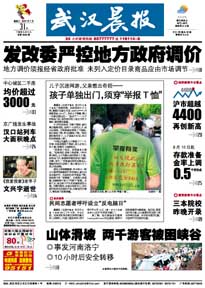
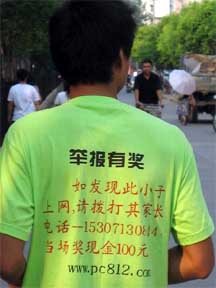
So I decided to run my survey within my
social circle. In spite of what you believe, I do not spend all day
communicating with Hong Kong bloggers or foreign correspondents. My
social circle is dominated by restaurant workers and hospital nurses.
The latter are often too busy to speak because they are working. So
here are the two interviews with Hong Kong restaurant workers. These
are the true grassroots workers instead of professional protestors or
whatever. The usual caveat applies: these are two individuals selected
non-randomly from the people of Hong Kong and therefore cannot represent the
general population of Hong Kong in any meaningful way. You can talk to
such people in your daily life and see what they think. I encourage
you to do that yourself.
[Note: This respondent is a captain in a restaurant located in Times Square,
Causeway Bay.]
Q: Have you heard about the Queen's Pier affair?
A: What are you talking about? What is the Queen's Pier?
Q: Queen's Pier is the pier outside Hong Kong City Hall. The
government wants to demolish it.
A: I have never heard of Queen's Pier.
Q: Hmmm ... let me backtrack in time. Have you heard of Star Ferry?
A: No. What is Star Ferry?
Q: This is the ferry service between Hong Kong Island and Kowloon
Peninsula. You can take the ferry to go between Central Distirct in
Hong Kong and Tsim Sha Tsui in Kowloon.
A: I have never taken that ferry.
Q: Wow ... how long have you been living in Hong Kong?
A: I came here seven years ago from a rural village in Guangdong
province. It would take four hours by bus to visit my hometown today.
Q: On what basis did you come here?
A: I was smuggled in illegally. At the time, I was seven months
pregnant. My husband paid a smuggler to take me to Hong Kong by
speedboat.
Q: Seven months pregnant? Are you aware that if the Hong Kong Marine
Police spotted the speedboat and gave chase, the smuggler would throw you
overboard in order to make the police boat stop and rescue you?
A: Maybe. But it did not happen.
Q: Since arriving in Hong Kong, where have you been?
A: My family lives in a public housing estate in Sheung Kwai Chung. As
you know, I work in a Wanchai restaurant. I leave for work at 10am
every morning and I arrive home after midnight. I work six days a
week. On my day off, I am usually too tired to do anything. So I
don't go anywhere. I only know Sheung Kwai Chung, Wanchai and Mongkok
(where I used to work).
Q: Have you gone up to Victoria Peak, for example? It is the most
famous tourist spot in all of Hong Kong.
A: I might have done that as a tourist once before I came down to live in Hong
Kong. But I am not sure.
Q: Have you been to Hong Kong Disneyland?
A: Are you kidding? It is too far too expensive. It would cause
more than HKD 1,000 for our family of three.
Q: So you really have not been to Queen's Pier/Star Ferry?
A: Why would I? I don't have the time or energy for that kind of
luxury. Even if I did, they don't seem like my first choice.
[Note: This respondent is a cashier working at a restaurant near the Hung
Hom Kowloon-Canton Railway station in Kowloon.]
Q: Have you heard about the Queen's Pier affair?
A: Yes. I have seen it in the newspaper at the restaurant. But I
did not pay too much attention.
Q: What is your personal connection to Queen's Pier, if any?
A: When I was a young child, the family used to take the small boat at Queen's Pier
in order to see my father. We called them the "put-put
boats" because of the sound that their motors make. My father was
the captain of a seafaring ship. We took the small boats to the ship
in order to visit him.
Q: What is your impression of Queen's Pier?
A: It really was nothing memorable. It was a place where people hang
out to fish for mud carps.
Q: Fishing for mud carps? Hmmm ... do you realize what you are saying?
A: Huh ... what do you mean?
Q: Fishing for mud carps. Read that phrase aloud and think about what
that sounds like. It is a homonym for something that should be very
familiar.
A: Fishing for mud carps ... wow ... I never realized that! You have a
sick mind!
Q: It's not about me. It is a social acceptable homonym for not saying
the original item. How could you not know that? Where have you
been? Anyway, let us get back to the original question. How
familiar are you with the places in Hong Kong?
A: Are you kidding? I am a local Hong Kong girl. I know
everything!
Q: That's fantastic. Let me probe you. First, once upon a time,
I decided to take a walk. I took the bus from Kowloon to Shatin but I
got off at Shing Mun Reservoir. I followed the road west. When I
came out, it was a public housing estate named On Yam Estate. Which
district is this?
A: It is in Sheung Kwai Chung. My sister-in-law lives in Shek Yam
Estate right across On Yam Estate.
Q: Next, where is the Hong Kong Penitentiary Museum?
A: I know! It is outside of the Stanley Penitentiary. I was a
volunteer worker once upon a time and we visited prisoners at Stanley
Prison. We had the opportunity to visit the Museum outside. I
seemed to remember that they had an exhibit for prisoners used to be caned.
[ ... some more geographical questions are omitted in the interest of time and space here
...]
Q: How do you feel about the demolition of Queen's Pier?
A: Hmmm ... nothing much. It was not a really distinguished
place. I have not been anywhere near there for decades. So I
really don't care.
Related Link:
看得到,不等於記得
宋 以 朗 ( 若 果 唔 知
佢 係 邊 位 則 閣 下 good fighter
Ltd 矣 ) 作 之 民 調 顯 示
, 香 港 人 覺 得 最 應
該 保 留 之 建 築 物 係
中 環 舊 郵 政 總 局 (
佢 訪 問 ![]() 兩 個 人 , 其 中 一 人
冇 意 見 ) 。 舊 郵 政
總 局 寶 貴 又 豈 止 其
饒 有 風 味 之 維 多 利
亞 式 建 築 而 已 , 其
座 落 之 處 更 係 成 個
香 港 核 心 之 所 在 也
。 此 話 怎 說 ?
兩 個 人 , 其 中 一 人
冇 意 見 ) 。 舊 郵 政
總 局 寶 貴 又 豈 止 其
饒 有 風 味 之 維 多 利
亞 式 建 築 而 已 , 其
座 落 之 處 更 係 成 個
香 港 核 心 之 所 在 也
。 此 話 怎 說 ?
As the saying goes, HARD PLASTIC! (which is Hong Kong slang for "Stupid dickhead"). The rules are simple: "No numbers, no speech right." It is unacceptable (especially for someone with the title of Professor) to whisper: "I've got a survey but I cannot show it to you. However, I can tell you that the results support my actions." This is like the democratically elected President with popularity ratings in the 20's saying, "I've got a survey that shows that I am much more popular than that. However, this is an internal confidential tracking poll and I cannot share the results with you." You must be a dickhead to claim that!
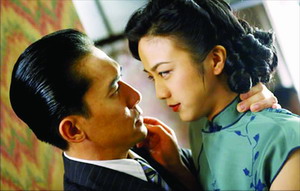
I want to say three things, officer. If you will let me, I shall die content. I want a clean mat and a white silk streamer twelve feet long to hang on the flag - pole. When the sword strikes off my head, not a drop of my warm blood will stain the ground. It will all fly up instead to the white silk streamer. This is the hottest time of summer, sir. If injustice has indeed been done, three feet of snow will cover my dead body. Then this district will suffer from drought for three whole years.
窦娥告监斩官,要一领净席。我有三件事,肯依窦娥,便死无怨。要太二白练挂在旗枪上。若刀过处头落,一腔热血休落在下,都飞在白练上者,若委实冤枉。如今是三伏天道,下心瑞雪,遮了窦娥尸首。着这楚州亢旱三年。
Yes, but so what? As blogger Lian Yue noted: On July 30, dark clouds began to gather in Beijing. People thought that there was going to be another huge rainstorm. Instead, at around 6:10pm, snow flakes began to fall in the East Third Ring area. Although the snow lasted only about five minutes, many people saw it. The snowflakes were about the size of a 5 cent coin and they melt immediately upon touching ground. Then a heavy rain came.
Snow in Beijing in July? That was enough to cause people to link this to some injustice. Is this an Internet rumor? Will the discussants get into trouble? Is it safer to say, "It did not snow on July 30th in Beijing"?
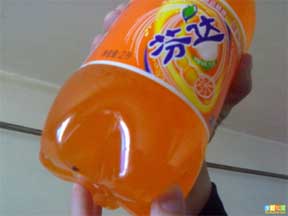
[in translation]
In May this year, I purchased a 2-liter bottle of Fanta. When I got home, I saw that there was a dark foreign substance inside. I called the telephone number printed on the bottle. The receptionist was very helpful and forwarded me to External Relations. At the time, nobody was there. Eventually, after a few days, Coca Cola assigned someone to handle the case. They promised to pay me 2 to 3 times in compensation, but in the form of products and not money. I did not accept the offer because I had just purchased a troubled product from them and I have not regained my confidence in their brand. Therefore, I did not want to be compensated with more products.
After failing to get satisfaction from the local Coca Cola representative, I tried to call the telephone number on the official Coca Cola website. I called several times but nobody picked up the telephone. I sent several emails to the address listed in the official Coca Cola website. I drew no response on the first three emails. On the fourth email, I attached the photographs of their Fanta bottle and I said that this was my last email because I have lost patience. Surprisingly, I received a telephone call from Manager S of the local Coca Cola Company External Relations Department. After half a hour of conversation, he invited me to come down to the office three days later to discuss the resolution of the matter. The appointment would be finalized on Monday morning (it was Friday when manager S called and their offices were closed on weekends).
On Monday morning, I cleared up my schedule to wait for the telephone call. At just past 8am, the telephone rang. A man told me that Manager S is very busy for the next two days and he will call again in a couple of days. He said, "Sorry." So once again, I waited for three more days and this was more than half a month after I purchased that bottle of Fanta.
Finally, I did arrive at the Coca Cola company. Manager S took me on a tour of the small Coca Cola museum, he explained the history of Coca Cola to me and he described certain public interest programs that the company is developing. He told that I am God to them (although I don't feel like I am God). But he said that the end result will be the same as they will only offer compensation in the form of products. Since he argued on the basis of the consumer protection law, I appreciate that the Coca Cola Company was not a law-breaking illegal merchant. Manager S said that the foreign substance in the Fanta bottle would be analyzed to determine its nature ...
The matter is now closed and I have taken the comensation in Coca Cola products. I have not received any answer about the foreign substance. I am puzzled as to whether a company that was only capable of adhering to consumer laws is fit to be the number one brand in the world.
(The player is in combat against a "mistress of corrupt official" clad in bikini)On July 25, an online game <The Incorruptible Warrior 清廉战士> went live for testing. On the first day, more than 300 people registered. But due to the media coverage, the game quickly drew broad interest. At Sina.com alone, more than 100,000 downloads were made. By July 28, the server was so congested that people could not enter the game, which was originally designed for 500 or so people online at the same time. The server has been shut down for upgrade.
What is so interesting about this game? After all, the executable file is only 78M, the pictures are crude, the scenes are spare, the copyright is suspect (because it borrows a great deal of material from other games), the lone server is unstable and the financial sponsor is the Chinese Communist Party Disciplinary Committee of the Haishu district in Ningbo city.
The reason for the public interest is that the hero of the game is an "honest and upright official" whose assignment is to weed out corrupt officials, along with their children and mistresses. Here 'weed out' does not 'putting in jail' -- it means using weapons, magic and torture to kill them. There are 165 major characters taken from Chinese history. On your side are the famous incorruptible officials such as Hai Rui and Lord Bao. On the opposite side are the famous corrupt officials such as Zhao Gao, Huo Shen and others who exhibit different degrees of force (=corruption) as indicated by the gauge levels over their heads. When you kill a corrupt official, you gain experience points. For example, killing the notorious eunuch official Wei Zhongxian from the Ming dynasty gains you 100 experience points. As you accumulate points, you increase your powers for "Combatting corruption," "Moral character" and "Degree of being corruption free" instead of the usual "life," "magic" and "strength" in other kinds of games. Your ultimate goal is to reach <Honest and Corruption-Free Paradise>, where "the birds sing, the flowers give out fragrance, the people are full of love and harmony, the nation is prospering and the world is calm and peaceful."
Here are some netizen reviews:
- The characters and scenes are crude, perhaps even cruder than games such as <Celestial Sword> ten years ago.
- When the monsters show up, their names are always either "son of corrupt official" or "daughter of corrupt official"
- Even if an official is corrupt, is it necessary to kill his children?
- Why do the "mistresses of corrupt officials" walk around in bikinis? Why do they have to fight without clothes?
- There are options for adding values and purchasing equipment. Is this one of the 'free' games that make money off the value-added services?
- A lot of the materials is taken from games such as <Romance of the Three Kingdoms>, <Legend> and others. Does the fact that the government made this game mean that they don't have to respect copyrights?
(The Wall Street Journal) Game Over for a Corruption-Battling Videogame in China. Loretta Chao and Juliet Ye. September 11, 2007.It seemed like a good idea at the time.
Two years ago, a group of officials in the bustling second-tier Chinese city of Ningbo, near Shanghai, took the initiative to battle government corruption at the grass-roots level. They enlisted China's growing armies of online videogame players in the fight.
Ningbo created an elaborate online role-playing game called Incorruptible Warrior, in which players wield weapons and supernatural powers to kill corrupt government officials, their bikini-clad mistresses and even their families. Players could pick off people with a single stroke or torture their quarry by striking repeated blows to the face. They were guided by 165 characters drawn from Chinese history or legend and shepherded through a virtual world corresponding to real places in Ningbo.
So it was that, at the height of the humid Shanghai summer, Wu Jiabin, a
22-year-old player, found himself walking through virtual snow, sword in hand, hunting for any sign of a corrupt official in centuries-old Chinese clothing. He had instructions from Emperor Kangxi, who ruled China (for real) from 1661 to 1772: "Turmoil is prevalent, with countless corrupted officials....To heal the world, I order you to kill the major corrupted official, called He Shen, who was extremely greedy, has the historic record for bribes in history and committed significant crimes. I order you to get 20 heads of He Shen."
Incorruptible Warrior went live in July -- for about three weeks -- before it was taken down. The Ningbo government hasn't offered an explanation, though at one point it posted a message on the game's main Web site citing technical difficulties. Officials of China's Ministry of Culture -- which regulates the online-games industry and normally would be the agency to shutter a game for excessive violence or other violations -- said they had nothing to do with shutting down Incorruptible Warrior. Other central government officials in Beijing declined to comment or didn't respond to requests for an interview.
The game went live amid a rash of high-level corruption cases -- from the July execution of the nation's top drug watchdog for graft to last fall's disgrace of the Shanghai Communist Party boss for mismanaging pension funds. It also sparked heated debate on the Chinese Internet, which at 162 million users is now the second-largest, following the U.S.
Still, some players and industry analysts theorize that Incorruptible Warrior was less a victim of Chinese politics than of shaky history, slow speeds and bad design.
"Lots of people laughed at the graphics," observes Leon Zhang, a blogger from Nanjing.
Online gamers in China take their virtual lives seriously, and "massive multiple-player online role-playing game," or MMORPGs, are extremely popular. In one game created by the Communist Youth League and Shanda Interactive Ltd., a leading Chinese videogame company, players are supposed to be members of the Red Army, fighting off Japanese invaders from 1937 to 1945.
Players spend an average of 28.2 Chinese yuan (about $3.75) a month on online game subscriptions and virtual accessories, according to technology researcher BDA China Ltd., but some have been known to spend thousands of yuan a month on the habit. China's online gaming market totaled $821 million last year, up 78% from the year before, according to BDA, which expects the market to expand 68% to $1.38 billion this year.
At the same time, the central government is pushing to build up something called the Online Game Fatigue System, which seeks to shield young people from too much exposure to Internet violence and pornography.
Despite its short life and audience of only about 8,000 players, Incorruptible Warrior caused considerable discussion among bloggers and forum posters in China. Some applauded the idea of spreading the anticorruption message through a pop-culture medium.
Shun Feng, a technology blogger from Yangzhou and author of "New Theories on Blogging" and "The Kingdom of Internet," said it was a "good try" by the Ningbo government to get common people involved. "The common practice in China is to leave the whole anticorruption thing to the government, but the youngsters are the ones with the potential to become corruptible politicians. ...That is why we need to educate them," said Shun Feng, the blogger's pen name.
Those who opposed the game warned it would be sending a misguided message to youth, who are spending an ever-growing amount of time in front of the computer. One blogger on the site Dragon Knight's Castle, with the online handle GZYZ, said "the anticorruption theme is misleading the youth, who will suppose the war against corruption is simply to kill them all."
Another blogger, Maoz, posting on his own site, Confucius Says, mocked the alarm the game had stirred up and reported an imaginary crime in which a schoolchild "from XXX Primary School of Ningbo is found addicted to the free anticorruption online game Incorruptible Warrior. He lost his mind on XXX date and stole in the bureau chief XXX's house and killed him and his families cruely with a pensil sharpener."
While the moral debate over Incorruptible Warrior continues to play out on the blogs here, players' disgust and derision at the game's technical flaws may be still keener.
Mr. Wu, who works at a Shanghai game company, complained that Incorruptible Warrior was sluggish and that he spent "five minutes killing one He Shen." Players say Incorruptible Warrior was also riddled with Chinese-character mistakes and mismatched historical facts. "He Shen was an official under Qianlong's rule," Mr. Wu said. "If Qianlong is the grandson of Kangxi, how could Kangxi know about He Shen?"
In the end, there were just too many technical issues for the game to take off, said Liu Bin, an analyst at BDA. "Peak concurrent users were over 1,000, but the game Web site only supported 500," he said. By contrast, popular MMORPG games can support thousands, and in some cases tens or hundreds of thousands, of concurrent players.
Local news reports cite a Ningbo social affairs official as having created Incorruptible Warrior originally to play with his friends and, after getting positive feedback, being given a budget of 10,000 Chinese yuan (about $1,200) by his supervisors to recreate it as a public event. A medium-scale, professionally created MMORPG can take one to three million yuan to develop. According to the Chinese language media, the government is working on upgrading the server for the game, but hasn't said when or whether Incorruptible Warrior will be back online.
Archives